Shakedowns and Shibboleths by Maddie Bannon
To prevent the end of humanity or the world, we are then permitted—even more we are required— to do just about anything.
Article by Maddie Bannon | @llspacejellyll
God is dead. God remains dead. And we have killed him. How shall we comfort ourselves, the murderers of all murderers? What was holiest and mightiest of all that the world has yet owned has bled to death under our knives: who will wipe this blood off us? What water is there for us to clean ourselves? What festivals of atonement, what sacred games shall we have to invent? Is not the greatness of this deed too great for us? Must we ourselves not become gods simply to appear worthy of it? There has never been a greater deed; and whoever is born after us—for the sake of this deed he will belong to a higher history than all history hitherto.”
Here the madman fell silent and looked again at his listeners; and they, too, were silent and stared at him in astonishment. At last he threw his lantern on the ground, and it broke into pieces and went out. “I have come too early,” he said then; “my time is not yet. This tremendous event is still on its way, still wandering; it has not yet reached the ears of men. Lightning and thunder require time; the light of the stars requires time; deeds, though done, still require time to be seen and heard. This deed is still more distant from them than most distant stars—and yet they have done it themselves.
Friedrich Nietzsche, The Gay Science (1882, 1887) para. 125; Walter Kaufmann ed. (New York: Vintage, 1974), pp.181-82

By now, I am sure my readers are at least somewhat familiar with Sam Bankman-Fried (SBF), the collapse of his exchange FTX, and his alleged crimes. Excellent reporting has been produced by many writers and podcasters, with exceptional material coming from Patrick Bet-David 1 and Whitney Webb 2. However, for those unacquainted with it, I will give a brief account of the unfortunate events as I understand them to provide context for the following discussion. Brief, since coverage of the events is not my current purpose—we will get to that. Below are some excellent resources for those entirely unfamiliar with the matter:
Justin Kan, founder of Twitch, provides best explanation of the FTX/Alameda scheme:
Forbes, perspective of formerly friendly media who featured him on their magazine cover before the fallout):
Upper Echelon, great information on SBF’s origins, his family, and collapse events:
How To Build, Then Demolish, A Castle in the Sky: A Step-By-Step Guide
1. SBF co-founded two companies, Alameda Research (2017) and FTX (2019). Alameda was a quantitative trading firm and hedge fund that made money on bets in the crypto industry and acquired returns for investors. FTX was founded as a digital currency “bank” and exchange, where sellers could hold their coins, trade, or make bets with them. One of FTX’s first investors was Changpeng Zhao (CZ), CEO of the by then very successful exchange, Binance.3 Six months after FTX’s launch, he invested $100 million and acquired a 25% equity stake.
2. FTX grew to be one of the four largest digital exchanges in the world by offering very low transaction fees, and achieved its highest valuation in January 2022 at $32 billion.4 The exchange issued a native coin, FTT, that FTX used to incentivize customers to transact. The majority of FTT was held “out of circulation” by FTX and Alameda.5
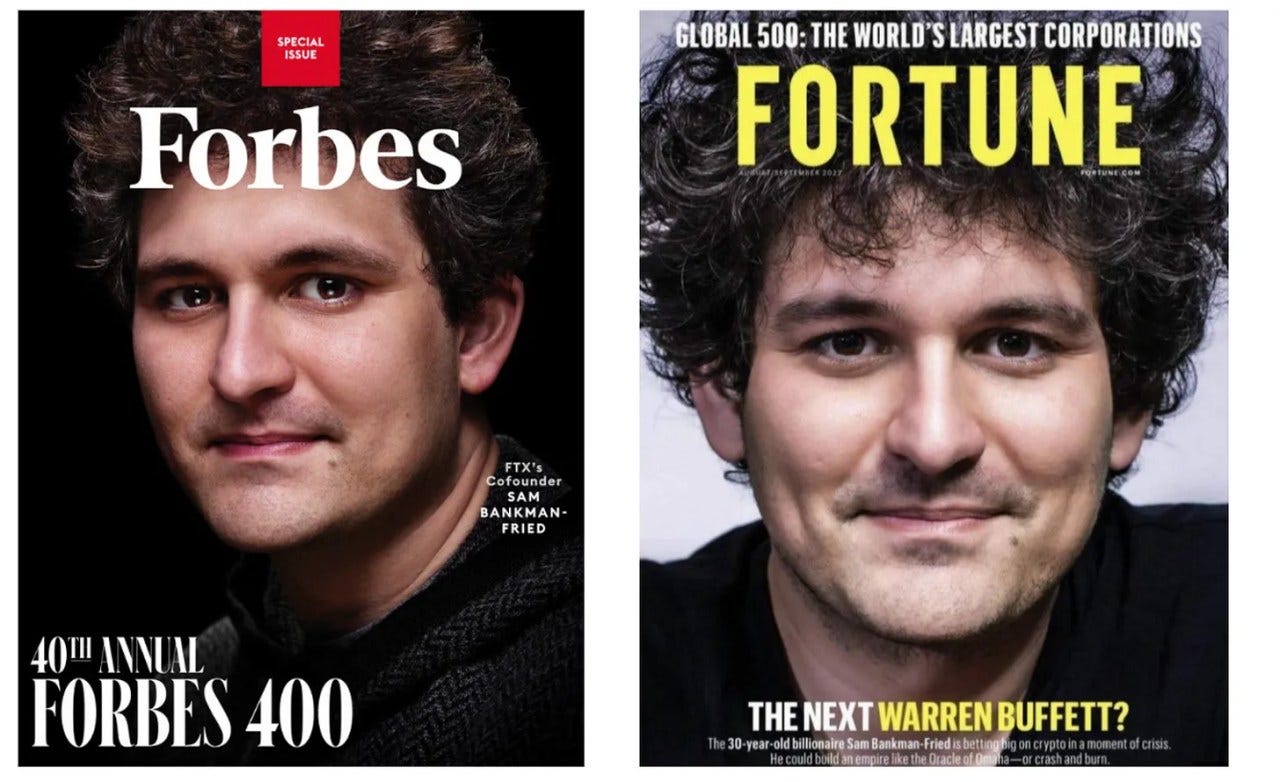
3. In 2021, FTX bought CZ out of his equity position for $2.1 billion. CZ was paid in digital currencies stablecoin Binance USD (BUSD) and FTT. 6
4. From 2021-2022, the digital currency market slumped. Many exchanges went out of business and, overall, digital currencies lost value. FTX bailed out exchanges like BlockFi, 7 and Alameda made a series of bad bets on crypto companies like Voyager 8 and Celsius.9
5. In September, 2022, FTX sent at least $4 billion of FTX funds to Alameda to prop it up after its bad bets.10 This included customer funds, FTT, and Robinhood equity. SBF announced this on Twitter as a routine measure, spinning it as “rotating a few FTX wallets (mostly non-circulating); we do this periodically. Might be a few more coming, won’t have any effect.” 11
6. On top of that, FTX lent Alameda ~$10 billion to fund trades and bets, using over half of the total customer assets on his exchange to fund the loan.12 Both uses of customer funds here and in #5 above were done without customer consent or knowledge, were illegal, and violated FTX’s terms of service.13
7. FTX bought FTT back from Alameda, artificially pumping the value of FTT and converting some of Alameda’s FTT holdings into liquidity (stolen from customers).14 This allowed Alameda to take out bigger loans using FTT as collateral.
8. In early November, 2022, crypto news site CoinDesk reported 15 on Alameda’s $14.6 billion balance sheet, noting that at least two-fifths of it was comprised of FTT, the majority being illiquid.16 Investors and customers became concerned about the health of Alameda, and therefore the health of FTX as the two were proven to be highly intertwined.

9. On the 6th of November, CZ announced on Twitter that Binance would be liquidating its ~$529 million holding of FTT 17. This sparked a bank run on FTX, with customers scrambling to withdraw their money from the exchange. SBF tweeted, “FTX has enough to cover all client holdings. We don’t invest client assets (even in treasuries),” but the tweet was soon deleted. Withdrawals were paused briefly after $5 billion in requests.18 FTX didn’t have enough cash (since it was locked up in Alameda) to cover its customers withdrawal requests and needed a bailout.
10. On the 8th, SBF asked CZ for a golden parachute. CZ tentatively agreed to purchase FTX, signing a letter of intent and starting the process of due diligence.19 A day later, Binance announced it would not pursue the acquisition of FTX citing reports of “mishandled customer funds and alleged US agency investigations.” 20
11. On the 10th, Alameda “wound down” their investments, suspiciously withdrew ~$200 million from their coffers,21 and pulled their website off the internet. FTX and Alameda Research collapsed in tandem without CZ’s or a similar investor’s bailout and the companies’ reputations were severely damaged. The following day, SBF stepped down as CEO of FTX and a number of businesses in the FTX Group including FTX and Alameda filed for chapter 11 bankruptcy. Customers have yet to be made whole, with ~$8 billion of their deposits lost.
12. In mid-December, an eight-count indictment was filed against SBF in the Southern District of New York (SDNY).22 His charges include conspiracy to commit wire fraud, wire fraud, conspiracy to commit money laundering, conspiracy to defraud the Federal Election Commission and commit campaign finance violations, among others. SBF was arrested in the Bahamas and extradited to the US.
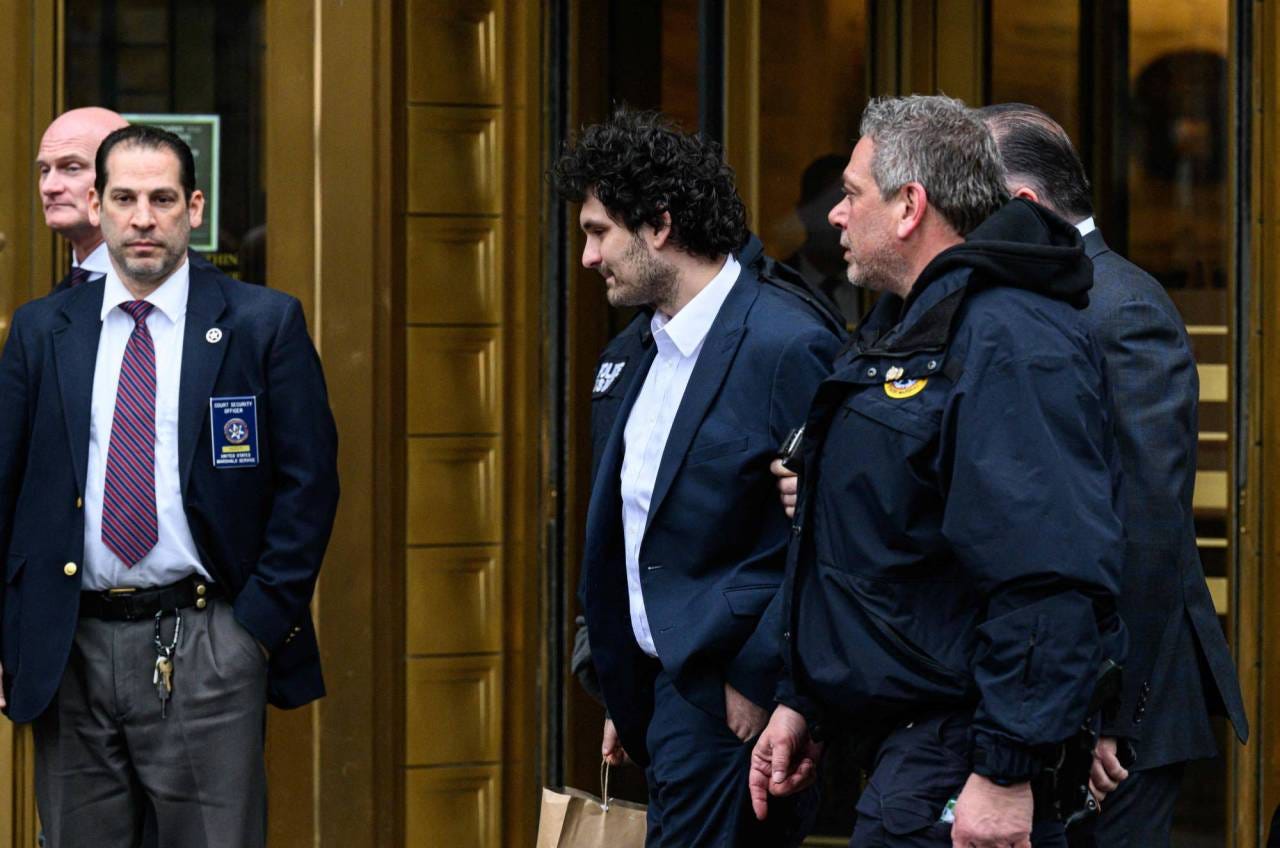
13. On the 3rd of January, 2023, SBF pled “not guilty” to the series of charges,23 with a trial date set for the 2nd of October, 2023. Caroline Ellison, CEO of Alameda, and Gary Wang, co-founder of FTX, have both pled guilty to criminal charges and accepted plea agreements for reduced sentences in exchange for cooperation and assistance in the federal investigations.24 SBF is now out of custody on a record breaking $250 million bail at his parent’s home in Palo Alto, CA.25
Puzzles of Propriety
Claiming to be an altruist, SBF’s rapid ascent to twenty-billion-dollar heights was propelled by his overt moral vows to make the world a better place and relieve suffering wherever it exists. Given the events just laid out, not many would describe SBF’s behavior as either moral or altruistic. Rather, one may choose words like “greedy,” or “selfish.”
Indeed, the term “altruistic” is used broadly “as the contrary of ‘self-interested’ or ‘selfish’ or ‘egoistic’—words applied to behavior that is motivated solely by the desire to benefit oneself.” 26 In this way, the act of helping someone up if they fall or giving $5 to a local charity is considered altruistic. Going about life with some consideration for others and doing something to benefit someone in need would be considered to be practicing the philosophy of altruism. This understanding, however, is misplaced.
You can call SBF an altruist, though, as much as anyone can be an altruist given the ethical framework’s manifold contradictions and inverse value structure. It really was the philosophy of altruism, namely its confused, 21st century offshoot “effective altruism,” that enabled and encouraged him and his likeminded twenty- and thirty-something colleagues to act as they did. To make it worse, it was the commonplace misconception of altruism as “benevolence” that gained him undue popularity and prestige, opening doors to the most powerful and influential people and institutions in the world, ultimately maximizing his harmful impact.
What has been missing in the coverage of the FTX/Alameda collapse and SBF’s criminal activity is an inquiry into the ideologies and philosophies that led to the companies’ meteoric rise and subsequent demise. This is an important exercise because, although SBF and his clique are out of business and likely going to prison for a long time (unless they get pardoned), the ideas that led them down their pathways of decision making continue to run amok. Furthermore, those that fell neck deep for SBF’s doer-of-good ruse may still fall for it again if it is embodied somewhere else. Admittedly, I nearly fell for the trap of considering CZ as a large-scale benefactor for precipitating the downfall of FTX. What is more likely is that CZ was acting contrary to altruistic principles—in his own self-interest—and, maybe, prevented something worse from happening as a byproduct of his choices.
Now that, as Nietzche’s madman put it, “God is dead,” our Western culture is ripe to fall prey to the would-be messiah types that espouse a surface-level morally seductive ethical system. Everyone, and understandably so, wants to believe that there is a good-intentioned, yet maximally powerful person out there who can solve the world’s problems and make life better for everyone. If even one such magnificent hero did exist, we might all sleep more soundly at night. The tremendous evil in our tragic world might have some chance of being defeated. Yet, this desire leads people to misplace their faith, dreams, and especially money, in just-plain-typical money-hungry businessmen like SBF, Elon Musk, Bill Gates, etc..
Adding to that, without the dictates of religion people are left to discern their own guiding moral principles. Most, it seems, do not do this. Instead, people readily adopt the moral principles of others without thinking them through, or they simply emulate those people they consider to be “good.” Perhaps they do this instead of generating a moral framework on their own because it is a difficult task. Or, perhaps, they are fearful of differentiating themselves from the crowd. This, I think, is the glue that sticks the woke ideology together. Regardless, secularism has left Western culture without a commonly held set of beliefs by which people can be confident they are operating morally.
This is not necessarily a problem; people do not need religion to be moral actors. However, it does leave people searching for answers. What is clear to me is that the answers being found and embraced widely and feverishly today are old ones, untenable in large part, and those that have already found their just refutation. What I aim to do here is to give a general understanding of the “answers:” Three related schools of ethical thought called utilitarianism, altruism, and, the newest of the bunch, though still not very original, “effective altruism.”

Effective Altruism (EA) was hurriedly adopted by SBF in his college years, and the associated institution was intimately involved in every aspect of his business, but its reach extends far beyond FTX and SBF. EA entities manage $26-45 billion in assets and investments in the UK and US,27 EA has been proclaimed to be a philosophy of choice by other well known figures like Elon Musk 28, Sam Harris, 29 and Dustin Muskovitz 30 (co-founder of Facebook and Asana), and its adherents are influencing the White House and US law.31
First, we will dissect two of the three primary answers to our modern moral puzzles. Then we will examine the inspiration for the philosophy of effective altruism, Peter Singer’s 1972 essay titled “Famine, Affluence, and Morality,” and the strange, disturbing places this philosophy has led its true believers. Finally, we will divorce from fantasy to take a look at what can be discerned about the true nature of EA and how people like SBF can use the dazzling veneer of do-gooderism to ultimately and selfishly benefit themselves.
For Goodness’ Sake!
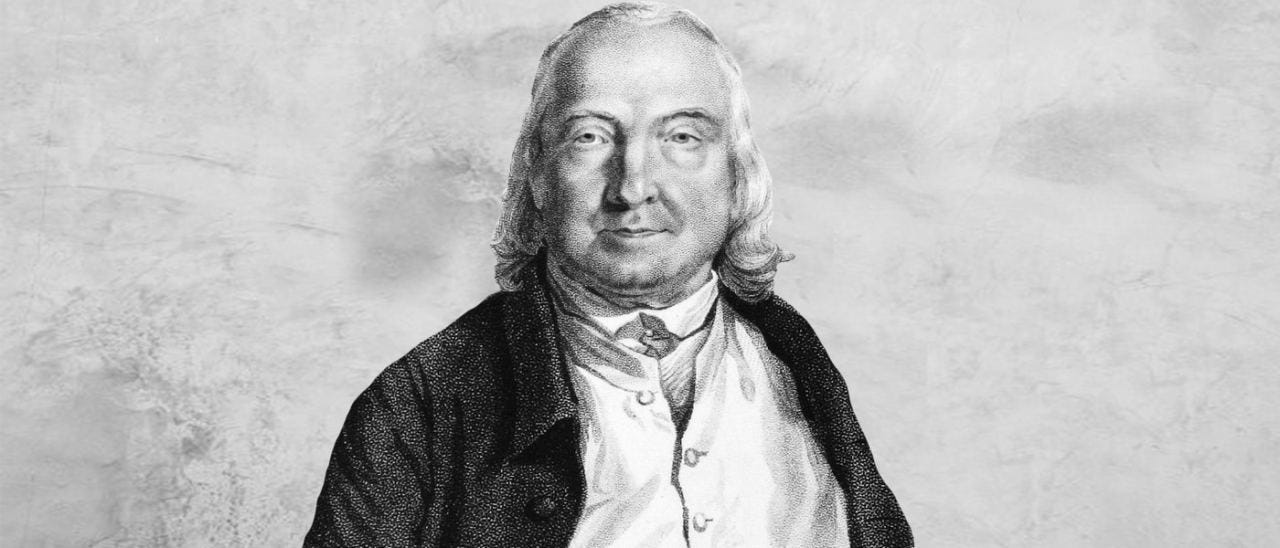
Utilitarianism is a branch of consequentialist philosophy coined and systematized by English philosopher, legal theorist, and inventor of the infamous and nightmare-inducing Panopticon,32 Jeremy Bentham (1748-1832).33 In consequentialist philosophies, the normative qualities (i.e. the “goodness” and “badness”) of actions are derived entirely from their consequences. Neither circumstances nor intentions matter here, only the end result.

For example, let’s say I made a promise to you to appear at an important business meeting at a certain time so that we, as partners, could sign a beneficial deal with a customer. If I broke the promise, either because circumstances made it so I was incapable of showing up on time (e.g. my car broke down, traffic, etc.) or I made the promise in bad-faith (i.e. never intended on fulfilling it), the goodness or badness of my not showing up to the meeting would be based on how the meeting went given my absence. If it turns out my absence aided in the signing of a deal, then me breaking my promise to you was a good thing to do. If the meeting went poorly because I wasn’t there, it was a bad thing to do.
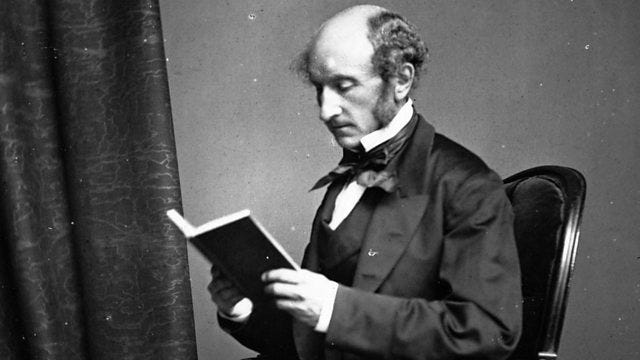
For utilitarianism, the consequence of import is what gives the philosophy its name: Utility. For classic utilitarians like Bentham and his student, prolific philosopher John Stuart Mill, the consequence of an action has utility when it promotes pleasure and avoids pain. The highest good is that which produces the maximum amount of pleasure and the minimum amount of pain, and the greatest bad is that which produces the maximum amount of pain and the minimum amount of pleasure.34 Before moving on, it is crucial to note that both Bentham and Mill, in their works on utilitarianism,35 relate pleasure closely to happiness.
Pleasure and happiness are related in the way that people are “happy” when their experience is more pleasurable than it is painful. Accordingly, whether or not one is happy is a matter of scientific calculus. To determine whether or not some action promotes happiness, one must simply measure the amount of pain and pleasure produced by the action. If the pleasure produced outweighs the pain, the action promotes happiness and can therefore be evaluated as good. To be good moral actors, we are obligated to act in ways that promote happiness. Therefore, we are obliged to engage in a scientific calculus when we act, and, according to Bentham, this includes “every action whatsoever.” 36
Going even further, classic utilitarians hold that the best actions are those which deliver the maximum amount of happiness to the greatest number of people. In this way, people have a duty to act in ways that promote maximum happiness in general. In the utilitarian moral calculus, one’s own pleasure is not valued more than the pleasure of others. If some potential action of mine would produce no pleasure for me, or even an amount of pain, but some greater amount of pleasure for others I am obligated to act that way.
Objections to Utilitarianism
One can object to utilitarianism in a great variety of ways. Below are just a few of those I find most compelling.
First, utilitarianism places an extremely laborious burden on every moral actor that, if put into practice, disrupts life in unacceptable ways. Before someone takes any action whatsoever, for example eating breakfast, they must first determine who all may be affected by their action, how different choices may affect both the pleasure and pain experienced by all of those people over all lengths of time, quantify the amount of pleasure and pain produced by each one of those actions in every affected party, and determine which choice would maximize the consequent happiness. If I want to eat some eggs, how much happiness will I derive from it? How much suffering am I incurring on part of the chickens and the farmer, or on part of the hungry who might derive more happiness from eating my eggs but who will, instead, go on hungry this morning? What if I ate toast and jam instead? Just to eat breakfast, then, requires doing calculus before getting out of bed.
Second, but along the same lines, it is unclear how pleasure and pain can be quantified. To put utilitarianism into practice, one must develop units of measurement for pain and pleasure and develop equations to determine things like whether or not a broken leg causes more pain than a death in the family. The multitude of pains and pleasures someone can experience in life are different in both degree and kind, rendering them incommensurate and, because of this, it is impossible to develop a universal standard of measurement. In addition, the amount of pleasure or pain derived from any one particular action (e.g. watching your child play a sport) is highly, if not entirely, based on the values of the individual (e.g. it is reasonable to assume you derive more happiness from watching your child play a sport than I might). It might then be concluded that, even if someone were willing and able to do the calculus utilitarianism requires, it may be impossible to do!
Finally, given what was just discussed, if we presume for a moment that one is willing to do the calculus required and it is possible to do, it would appear a utilitarian calculus would lead us to strange, bad, and counter-commonsensical conclusions. A typical example of how this calculus can go wrong is this: Let’s say there is a man with no living family and no children or spouse. He lives a hermitic life but he is very healthy. Let’s say, as well, that there are five people in the hospital dying of organ failure; one needs kidneys, one needs a heart, one needs a liver, one needs lungs, and the last needs a large intestine. Each of them happen to have the same blood type as our hermit. It would seem, then, that the “good” thing to do would be to harvest the hermit’s organs and save the five people in the hospital from death. Certainly, saving five people from death would promote more happiness than the pain suffered by the death of one hermit. Right? 37
More objections to utilitarianism can be thought of, and have been thought of already,38 though these I think are sufficient to make the point that it certainly is not practicable nor a coherent ethic by which to judge one’s own actions or those of others. Most interesting to me is that utilitarianism’s chief and most successful proponent, the aforementioned John Stuart Mill, rejected its foremost principle later on in his life. In his autobiography, published in 1873 after his death, he writes:
I never, indeed, wavered in the conviction that happiness is the test of all rules of conduct, and the end of life. But I now thought that this end was only to be attained by not making it the direct end. Those are only happy (I thought) who have their minds fixed on some object other than their own happiness; on the happiness of others, on the improvement of mankind, even on some art or pursuit, followed not as a means, but as itself an ideal end. Aiming thus at something else, they find happiness by the way. The enjoyments of life (such was now my theory) are sufficient to make it a pleasant thing, when they are taken en passant [in passing], without being made a principle object. One make them so, and they are immediately felt to be insufficient. They will not bear a scrutinizing examination. Ask yourself whether you are happy, and you cease to be so. The only chance is to treat, not happiness, but some end external to it, as the purpose of life.
Mill, J. S. (2006). Autobiography. In J. M. Robson & J. Stillinger (Eds.), Collected Works of John Stuart Mill (Vol. 1, pp. 145–147). essay, Liberty Fund. (my emphasis)
Who are you, if you are selfless?
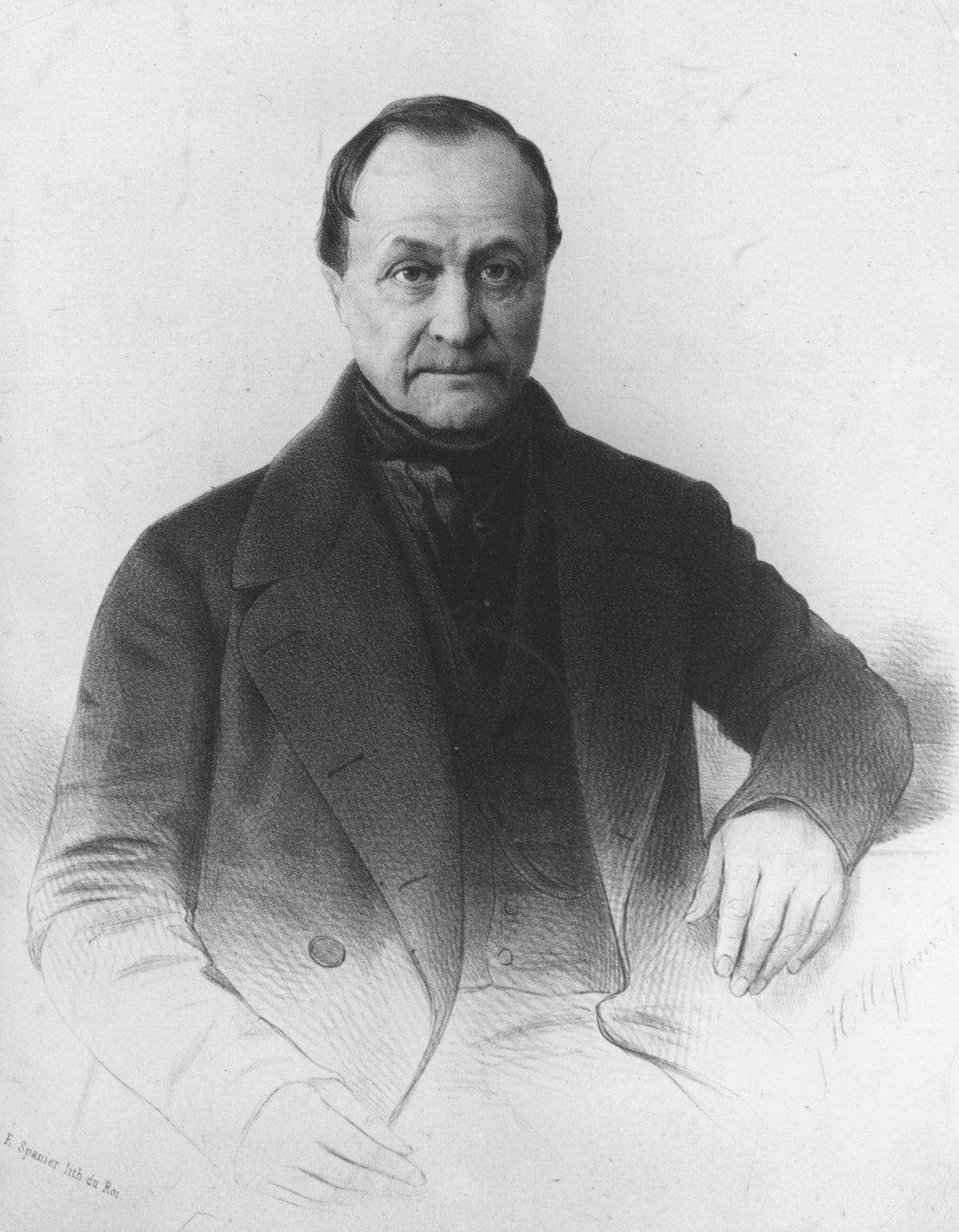
The roots of altruism, a duty-based ethical system, can be found in 19th century France. Auguste Comte (1798-1857),40 a contemporary of John Stuart Mill, is credited with coining the word and thoroughly developed the moral framework while producing his primary work on “social physics” or what we know today as sociology.
As a brief aside, although a relevant one to our purposes, it is important to note that Comte was an early adopter, if not the progenitor,41 of positivism. Positivism 42 asserts that knowledge of matters of fact can only be based in that which is experiential (i.e. available to the five senses). Furthermore, the only justifiable claims to be made about truth are those that can be scientifically verified or represented in mathematical formulae or logical proofs. Given this, positivists thoroughly and outrightly reject claims about anything that cannot be experienced or proven and thus positively evidenced like generalizations, abstractions, and inductions, and so regard metaphysical inquiries into cause, being as such, universals, etc., as fantastical wastes of time.
Due to his positivist philosophy, Comte was exclusively concerned with the experiential and provable nature of ethical behavior. Like Bentham and Mill, Comte sought to remove the instinctive, emotional, incommensurate, and seemingly irrational force from morality and instead offer a scientific basis for good behavior. Indeed, he thought it was imperative to do so for the benefit and progress of society.43 Progress in society, he claimed, can only be made when people cooperate with one another at large, but this is obstructed and overridden by the affections people have for their families, those nearest to them, and their self-interest.
Self-interest and the tendency to prioritize one’s family, Comte thought, are merely instinctual but changeable characteristics of human nature. He, ironically, staked his science-based morality in phrenology.44 Studying the shapes and measurements of the human skull, Comte believed science had discovered the number of modules “in the brain” each of which being associated with an “affection” like intellect, goodness, attachment, etc. He thought the modules of emotion and intellect were adjacent in the brain, and their functions connected.
Without getting too far into the weeds with phrenology, it suffices to say that Comte thought the modules associated with intellect were more proximal to those of selflessness and cooperation than they were to egoism, allowing him to conclude that the more intelligent one becomes, the more sociable, amenable to cooperation, and selfless one is.45 At the same time, it allowed him to assert that the more time one spends being selfless in society, the more intelligent one becomes. Therefore, self-interest and familial bias can be reduced if not eliminated altogether by adequately increasing one’s intelligence or being sufficiently “stimulated by life in society.”46
It follows from this, then, that the cultivation of the self was highly discouraged. Personality, liberty of conscience, equality, and sovereignty of the individual are all ideas Comte describes as “metaphysical dogma,” serving only as obstacles in the way of societal progress.47 As collective progress, the ultimate purpose for humanity in Comte’s view, requires cooperation, and cooperation can only be achieved by fostering it at large and in opposition to self-interest and familial affection, Comte proposes as his moral framework altruism.
The word altruism was derived from the French word autrui, which means “other people.” Comte invented the word intentionally in direct opposition to egoism, so we can understand it in plain language as “other-people-ism.” This aligns well with his definition of altruism as “living for others” (vivre pour autrui). For society to progress, he argued, all of its constituents must completely abandon self-interest and make only those choices that benefit other members of the society or the society at large.
As mentioned at the start, the “modern” understanding of altruism is little more than kindness or charity. Over the past couple of centuries, sly yet significant amounts of egoism have been inserted into the concept of altruism to make it no more than an equivalent of other words we have to use to describe the consideration of others.
For instance, the aforementioned John Stuart Mill, a contemporary of Comte, argued that only a limited form of altruism (i.e. weak altruism) is tenable. Altruism goes even further than utilitarianism in devaluing and deploring the pursuits of personal happiness, selfish pleasures, and prosperity, and Mill thought such a moral principle impossible. People would outright reject the notion of totally sacrificing these pursuits for the sake of society, and they did. While Mill clearly thought altruism is a necessary component of acting morally, he eventually argued the obligations of other-people-ism should be limited, for practical purposes, to acts that affect those near to the actor (e.g. family, friends, neighbors, etc.). Only those serving in high-consequence public offices should be required to consider and prioritize society as a whole in their moral decision making.48
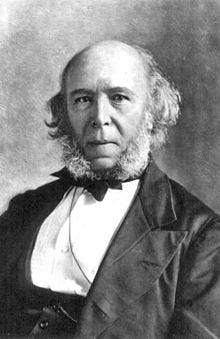
Others, like Herbert Spencer (1820-1903) likewise dismissed total subjugation of the self, but still regarded altruism as essential for progress in society. In his conception of ethical behavior, egoism precedes altruism since egoism is required for survival and the basis of human welfare. Only adequately egoistic individuals have the means to act altruistically, therefore total subversion of selfish interest would make altruism impossible. Weakening and watering the definition of altruism down even more, sociologist Pitirim Sorokin (1889-1968) regarded as interchangeable the words “love” and “altruism.” Altruistic acts are, to him, “all the actions that produce and maintain the psychological and/or physical good of oneself and others through positive actions.” 49 In his view, altruism is “love in action,” 50 and contains elements of generosity and love precisely because it is not compelled by moral obligation as it would be in Comte’s deontological vision of duties and rights.
Thus, we arrive at the modern conception of altruism, it being no more than the simple consideration of others in everyday activities. Stanford’s Encyclopedia of Philosophy defines altruistic acts as “includ[ing] not only those undertaken in order to do good to others, but also those undertaken in order to avoid or prevent harm to them” and “need not involve self-sacrifice, and they remain altruistic even when they are performed from a mixture of motives, some of which are self-interested.” 51 Do good for others and avoid harming them, for either selfish or selfless reasons, and you’re a true altruist, they say.
Objections to Altruism
My honest and simple inquiry regarding the modern conception of altruism is this: Why use a word invented to denote something incredibly different than its original referent when we already have adequate and more precise words to do so? Kindness, generosity, benevolence, compassion, consideration, conscientiousness, empathy, and charity already exist in our modern vocabulary, yet some insist on using the word altruism instead (Comte is rolling in his grave). It pains me to find a reason why the standard definition of considerate does not meet the criteria: “Thoughtful of the rights and feelings of others.” 52
The most pointed objection to the idea of altruism, as it is used today, is simply that it is a truism, self-evident and pointing out nothing new or interesting about the world. People agree that morally good acts are those which, when applicable, take into consideration the affects the act may have on others as well as oneself. When someone does something to benefit another without gaining anything for themselves, we call it charity or being generous. We could discard the word altruism altogether and lose absolutely nothing.
Now, the classic, “strong” conception of altruism may have been forced to morph into the analog of consideration we see it being used as today because it was met with resounding, annihilating refutation immediately and later on. We have already discussed Mill’s response to Comte’s altruism, however objectivist and moral egoist, Ayn Rand (1905-1982), offers the coup de grâce.
What is the moral code of altruism? The basic principle of altruism is that man has no right to exist for his own sake, that service to others is the only justification of his existence, and that self-sacrifice is his highest moral duty, virtue, and value.
Do not confuse altruism with kindness, good will or respect for the rights of others. These are not primaries, but consequences, which, in fact, altruism makes impossible. The irreducible primary of altruism, the basic absolute, is self-sacrifice—which means; self-immolation, self-abnegation, self-denial, self-destruction—which means: the self as a standard of evil, the selfless as a standard of the good.
Do not hide behind such superficialities as whether you should or should not give a dime to a beggar. That is not the issue. The issue is whether you do or do not have the right to exist without giving him that dime. The issue is whether you must keep buying your life, dime by dime, from any beggar who might choose to approach you. The issue is whether the need of others is the first mortgage on your life and the moral purpose of your existence. The issue is whether man is to be regarded as a sacrificial animal. Any man of self-esteem will answer: “No.” Altruism says: “Yes.”
53 Rand, Ayn. Faith and Force: The Destroyers of the Modern World,” PWNI, 74; pb 61.
Quote found in:
Rand, A. (1988). A: Altruism. In H. Binswanger (Ed.), The Ayn Rand Lexicon: Objectivism from A to Z (pp. 4–5). essay, Penguin Books.
In short, those that benefit in an altruistic society are those with the least means or willingness to provide for themselves. Conversely, those that suffer from altruism are those with the most. This elevates the traits of neediness, suffering, failure, and lacking to primary social values, and assigns rights to the needy and indolent over the property and prosperity of those more capable and self-sufficient. To succeed in life, business, or health, whether by one’s own means or even by chance, is to be placed on the altar of self-sacrifice voluntarily or otherwise. There is no choice to possess more than what is needed to survive, it belonged to the needy and indolent as soon as it was created or acquired.
Rand does not consider generosity, kindness, or benevolence as bad—far from it. She abhors “strong” altruism precisely because it makes those most treasured human characteristics impossible. If one is compelled by duty to give time, property, or labor to another who is needier, who thus has a right or entitlement to what one gives them, there is no generous deed or act of kindness being done. Only the repayment of a debt, or a “mortgage” as Rand would put it. With a financial debt, failing to make payments results in financial punishments like fees and a lower credit score. Likewise, for altruism, failure to self-sacrifice would be considered delinquency and would result in the issuance of moral blame and social shame. Most people, including Rand and myself, want to live in a world where people exhibit kindness, generosity, benevolence, etc., but these can only exist when helping others is not obligatory, but it is done anyway.
Moral Money Machine
When deliberating what to call their newfound and rapidly spreading ideology and the category of non-profit institutions they created to reify it, Australian philosopher of ethics Toby Ord and Oxford philosophy undergrad Will MacAskill considered various combinations of the words “good,” “rational,” “evidence-based,” “utilitarian,” “optimal,” and “maximization.” 54 In one deliberative email, MacAskill writes, “we need a name for ‘someone who pursues a high impact lifestyle’. This has been such an obstacle in the utilitarianesque community – ‘do-gooder’ is the current term and it sucks.” 55 At some length, they settled on “effective altruism” (EA) with the non-profit headquartered at Oxford its “Centre.” 56 At last, in 2011, with a name for their ideology and a name for themselves, effective altruists, they began the process of marketing and “movement-building.” 57
The Centre for Effective Altruism (CEA) at Oxford was created to serve as an umbrella organization with a paid staff, itself comprised of two existent non-profits, Giving What We Can (GWWC) and 80,000 Hours (80kH), established in 2009 and 2011 respectively. Both Ord and MacAskill cite Peter Singer’s 1972 paper, “Famine, Affluence, and Morality” as the origin point of their hypermoralism,58 with it serving as the direct inspiration for the establishment of GWWC in 2009 and EA in general. 122 years after its invention and mass rejection, classic altruism clawed its way back into modern ethical thought through the pen of Peter Singer. This time, however, it found far fewer polemic reactions and was permitted to permeate through society and into the classrooms of every Philosophy 101 student.
Far-fetched, Absurd, and Monetary
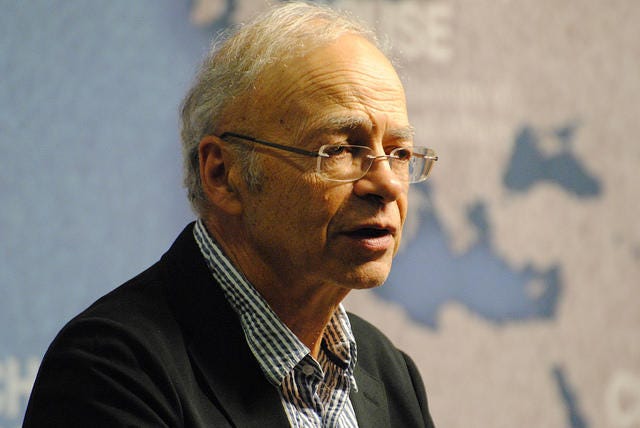
Singer, in “Famine, Affluence, and Morality,” 59 takes the basic thrust of utilitarianism (i.e. moral decisions can be made via calculus) and combines it with the social imperative and duty-based framework of classic Comtean altruism. In a slight, but revealing, departure from utilitarianism, Singer’s focus is not on happiness, or human flourishing, or the pleasantness of life, but hones in narrowly and exclusively on suffering which he equates with badness. The kind of suffering Singer is concerned with, at least in this particular paper, is pain and death due to hunger and starvation, disease, and poverty, though MacAskill and Ord would go on to extend this conflation to all suffering.60
In essence, Singer argues that each person on Earth, especially each person living in an affluent nation, is obligated (i.e. has a moral duty) to relieve the suffering of others and to prevent suffering from occurring in the first place. He makes the argument by way of a first principle, assumed as obviously and incontrovertibly true, from which all of his other claims follow:
The Principle of Sacrifice
If it is in our power to prevent something bad from happening, without thereby sacrificing anything of comparable moral importance, we ought, morally, to do it.
61 Peter Singer, 1972. ‘Famine, Affluence, and Morality’, Philosophy and Public Affairs 1:229–243.
One of Singer’s primary claims is that the proximity of the “something bad,” or the potential for it, to the moral actor is not at all significant in regard to this principle. 62 If there is but one person (or animal, but we’ll leave this aside for now) in suffering or in danger of suffering anywhere on Earth, everyone everywhere is obligated to do something to relieve or prevent the suffering. As for “comparable moral importance,” Singer defines this as “anything else comparably bad.” This allows Singer to claim that, if there is someone somewhere starving, for example, you are morally obligated to relieve their hunger insofar as you stop just shy of starving yourself (he calls this “marginal utility”). To do anything less entails moral culpability.
Going even further, and diving head-first into the realm of absurdity, Singer assigns direct moral blame for the suffering or death of someone to you if you are aware of it and do nothing. In other words, if you are doing more with your life and means than basic survival, you are guilty of manslaughter, if not murder. For, surely, at least one person has died in your income-earning lifetime from starvation or disease or poverty and, so long as you were living beyond basic survival and had some inkling as to the possibility someone could be suffering in this way somewhere, you are responsible for that person’s death.63
You might be wondering how it is reasonable for Singer to expect all people everywhere to keep tabs on the suffering of all others everywhere so as to fulfill their moral duties and avoid moral blame. The answer, he claims, is simple. You don’t. All you have to do is give away your “excess” money, earned and owned by you, to charities and the government. You can, literally, buy your redemption and salvation, but at what price is Singer selling it?
Instead of having the freedom to choose to buy a new coat, or pursue your hobbies, or invest in your future, or enjoy nice food, or go on vacation, you are morally obliged to give the funds you would otherwise use to fulfill those pursuits to organizations and institutions that have the purported purpose of relieving or preventing the suffering of others. So long as there is any suffering anywhere on Earth, per Singer, there is absolutely no moral justification for you to be doing any better in terms of health or prosperity than those suffering. As we saw earlier, in this ethical scheme the cultivation of the self is highly discouraged and even deplored as bad, and the flavor of altruism is most prominent in Singer’s assertion that acting in this way “is not charitable, or generous […] on the contrary, we ought to give the money away, and it is wrong not to do so.” 64
Eugenics + Infanticide – Human Sanctity = Modern Ethics
Before moving on to the trail Ord, MacAskill, and SBF followed from here, it is important to highlight the bizarre and morally bankrupt places this kind of ethic can take someone. First, in “Famine, Affluence, and Morality,” Singer makes known his support for rigorous population control. In his arguments, he sounds as though he read the Club of Rome’s The Limits to Growth 65 just prior to writing his paper, and this is not an untenable assumption since the book was published that same year, 1972. In his paper he cites overpopulation and limited resources as some of the primary causes of suffering, particularly suffering from famine, writing:
“The conclusion that should be drawn is that the best means of preventing famine, in the long run, is population control. It would then follow from the position reached earlier that one ought to be doing all one can to promote population control […] Since there are organizations working specifically for population control, one would then support them rather than more orthodox methods of preventing famine.”66
And
“The facts about the existence of suffering are beyond dispute. Nor, I think, is it disputed that we can do something about it, either through orthodox methods of famine relief or through population control or both.”67
Peter Singer, 1972. ‘Famine, Affluence, and Morality’, Philosophy and Public Affairs 1:229–243. P. 240.
Relatedly, but even more controversially, in his later academic years Singer would also go on to advocate for infanticide and adult euthanasia as “obvious necessities of the modern world.” 68 He claims, in utilitarian fashion, that there are some lives “not worthy to be lived.” 69 For babies, being unconscious creatures and of “less value than the life of a pig, a dog, or a chimpanzee,” he argues that parents and physicians ought to have the right to kill the infant within 28 days of its birth if they agree its life will be “miserable or so devoid of minimal satisfaction that it would be inhumane or futile to prolong life.” 70 And, here, we can see his utilitarian ethics shine:
When the death of a disabled infant will lead to the birth of another infant with better prospects of a happy life, the total amount of happiness will be greater if the disabled infant is killed. The loss of happy life for the first infant is outweighed by the gain of a happier life for the second. Therefore, if killing the [disabled] infant has no adverse effect on others, it would, according to the total view, be right to kill him.
71 Specter, Michael. “The Dangerous Philosopher,” The New Yorker. 09/06/1999. Accessed 02/14/2023. DOI http://www.benegg.net/_private/Specter.pdf
Along the same lines, Singer finds the “sanctity of human life” to be obsolete. “The notion that human life is sacred just because it’s human,” he stated in 1999, “is medieval.” 72 All life is equally important, he claims, and humans and animals suffer in the same way and to the same degree. Some animals are “persons,” meaning they are self-conscious creatures, and some humans are not. So, he believes “a human’s life is not necessarily more sacred than a dog’s, and that it might be more compassionate to carry our medical experiments on hopelessly disabled, unconscious orphans than on perfectly healthy rats.” 73 This is how the animal-rights movement was born.74
Dekate or Delinquent
The impact of “Famine, Affluence, and Morality,” and Singer’s other, less seemly ideas, and the reconstitution and remixing of bleeding-heart utilitarianism and obligatory altruism, on Ord and MacAskill is clear in their endeavors in EA. Their first step was to create Giving What We Can (GWWC), with a mission to “make giving effectively and significantly a cultural norm. We mean this quite literally: our goal isn’t just to marginally increase the amount of money going to effective charities—we’re aiming to make meaningful cultural change.” GWWC accepts the notion that people have a duty to give money away so long as suffering exists and they want to instantiate that sense of duty in as many people as possible. To gain some traction, marketability, and avoid being rejected outright, it does away with the extreme and absurd proposal of Singer to reduce one’s life and means to basic survival. Instead, it proffers a “modest” ask: That one give at least a tithe (from the Greek “dekate” meaning “a tenth part”) to the church of suffering, 10% of one’s earned income over a lifetime.75
Then, in 2011, MacAskill and his fellow graduate philosophy classmate, Benjamin Todd, launched 80,000 Hours (80kH). Building on GWWC, 80kH implores you to take up a career through which you can make the maximum amount of money so you can give the maximum amount away. Where being good means giving money away to charities, making more money makes a person better. With that said, 80kH certainly does not recommend you take up a career as a doctor so that you can deliver medical aid to those that need it or become a social worker to help people out of poverty. Those methods of directly improving people’s lives are low-impact and ineffective; still good to do, but the best of people do better. The most effective altruists “earn to give” and, instead, choose careers in consulting, quantitative trading, and finance and work at places like Jane Street or Alameda Research.76
In late 2011, in the midst of the Occupy movement, MacAskill gave a talk at Oxford called “Doctor, NGO Worker, or Something Else Entirely? Which Careers Do the Most Good.” That year saw the launch of 80,000 Hours, an offshoot of Giving What We Can designed to offer “ethical life-optimisation” advice to undergraduates. His advice, which became known as “earning to give,” was that you—and the “you” was pretty explicitly high-calibre students at élite institutions—could become a doctor in a poor country and possibly save the equivalent of a hundred and forty lives in your medical career, or you could take a job in finance or consulting and, by donating intelligently, save ten times as many.
Lewis-Kraus, The Reluctant Prophet of Effective Altruism. The New Yorker, Annals of Inquiry, 08/08/2022. Accessed 02/05/2023. DOI https://www.newyorker.com/magazine/2022/08/15/the-reluctant-prophet-of-effective-altruism. (MY EMPHASIS) https://archive.ph/qqbW6
God People Science Deciding Moral Questions
After Will MacAskill published his first book in 2015 titled Doing Good Better,77 which is selling for $62.99 on Amazon now, he went on a speaking tour about EA. This included one stop at Church House, headquarters of the Church of England in Westminster Abbey, for a debate hosted by Intelligence Squared.78

His “opponent,” a fawning and submissive man who referred to MacAskill as a “saint” multiple times during the debate, was priest and philosopher Giles Fraser. Though the debate was more of an occasion for MacAskill to receive compliments followed by a Q&A, the following exchange between Fraser and MacAskill is exemplary in terms of providing an unambiguous sense of Effective Altruism and its problematic nature:
Fraser: Philosophers love the “burning building” scenario. So you’ve got two rooms, the building is burning, and you can save either the thing in one room or the thing in the other. That’s the choice that you have. So, imagine there’s a child in one room and there’s a Picasso in the other. The building is burning. Now, the effective altruist could argue that you can sell the Picasso for many millions, and with those millions give that money to charity, to a Malaria net charity, which will then save a great many, on a cost-benefit analysis, will save a great many more children, okay? So, the effective altruist, faced with a burning Picasso and a burning child might save the burning Picasso. Now at this point, my sympathy for effective altruists just disappears. And it disappears because I think there really is something that’s not factored in here, which is the emotional sympathy, which is absolutely essential, which you [MacAskill] have done everything you can to eliminate from our calculations. But, I would call the person, and I know we disagree about this, and I mean I think the technical term for the person that saves the Picasso, and I think this would be a sort of, publicly I would get a lot of support for this, maybe not here [at the Intelligence Squared Debate], but out there [in the world], the technical term for the person that saves the Picasso over the burning child is “heartless bastard…”
Moderator: What would you do, Will?
MacAskill: Okay, terrific, so first question is do you think lives of African children are less important than the life of that child in the burning building?
Fraser: No.
MacAskill: Okay […] in the world we live in, which is a very morally counter-intuitive world, it’s not a world in which our moral intuitions are are well adjusted, there is no difference between the Picasso case and the case where there’s one thousand children in one building and the one child in the other.
Fraser: There really, really is. There really is a difference.
MacAskill: Because there are many, many people out there who are effectively in that burning building, they effectively are at risk of dying right now and you just have a slightly more indirect causal mechanism, which is taking a Picasso and selling it and making a million and then giving it. And so, those people are far away, and you say that’s a lack of sympathy. But actually it’s a more cultivated sense of sympathy—you’re just empathizing with the person that is right there in front of you whereas the person who is willing to reflect on those arguments, they’re able to sympathize with people of the other side of the world, who are just in need of help. So the answer is yeah, I would save the Picasso, and I agree that this seems weird, but that’s because we live in a very weird world, a world where money is so incredibly powerful.
Ibid. 17:50-22:07
A more adversarial debater might have responded to MacAskill by asking if his response would remain the same if it were his child in the burning building. Even with that, it would be difficult for MacAskill to believably defend his choice of hypothetical action in the hypothetical scenario as he has neither a wife (he is divorced) nor any children of his own. Regardless of MacAskill’s genuine comprehension of what he prescribes, or lack thereof, the imperatives of effective altruism include the mandates to value one’s own life and the lives of one’s family and community as perfectly equal in moral significance and general importance to all other lives, to ignore or annihilate any “irrational” or incommensurate sympathies you may have towards them which are certain to throw the cost-benefit analyses in their favor, and to prioritize the generation of money for the sake of strangers. Only then can altruism be truly effective.
Effective altruism (EA) is defined as “an intellectual project, using evidence and reason to figure out how to benefit others as much as possible. And it’s also a practical project: to take action based on this research and build a radically better world” 79 or “doing good better.” 80 EA exponents place its importance and uniqueness in EA’s reliance on impersonal, positively evidenced mathematical models that can allow people to direct goodness (money) where it is needed most and where it will relieve the most suffering, fulfilling the practitioner’s moral duty and delivering maximal redemption. Furthermore, using the same quantitative framework developed at Open Philanthropy (funded mainly by Facebook co-founder Dustin Moskovitz)81 EAs claim to have the best sense of what the real, important problems the world faces are and how to address them.

What seems to compel EA adherents to action on a particular problem is neither moral intuition nor a feeling of compassion or love, but rather a series of calculations based on quantities of suffering, scale, neglect, and solvability. How they quantify suffering is a mystery to me. As mentioned before in regard to happiness and pain in utilitarianism, suffering, too, exists in a great many dimensions and often in incommensurate forms. For example, the suffering a world-class athlete experiences in training in pursuit of physical greatness cannot be measured against the suffering someone experiences after being rejected on a date. Presumably, like Singer, and as Comte proposed, they take into consideration only those things that can be measured and represented in mathematical formulae (e.g. the number of people living on less than $X a day, or of identified cases of disease per area, etc.), ignoring the entirety of what remains of the human experience, and conflate those numerical values with “quantity” of suffering.
EA “takes as its premise that people ought to do good in the most clear-sighted, ambitious, and unsentimental way possible.”82 In a seemingly identical fashion to Comte’s framing of altruism, EA asks people to divorce oneself entirely from ego, from emotion, intuition, and self-interest when making moral decisions. “It’s easy — and reasonable — to have special concern for one’s own family, friends, or nation,” they argue, “ but, when trying to do as much good as possible, it seems that we should give everyone’s interests equal weight, no matter where or when they live.”83
“Well, I don’t think there is any question about it. It can only be attributable to human error. This sort of thing has cropped up before, and it has always been due to human error.” – Hal 9000, “2001: A Space Odyssey.”
As conscious human beings, with necessary and immutable self-interest that is not only requisite for self-preservation and procreation (AKA the continued existence of the human species), but also serves the basis for the affinities we have for particular, proximal people that compose the family or even societal structure in which we exist, it seems that we would need to be something other than human to give everyone’s interests equal weight. But, that’s what, as far as I can tell, EA asks; to export one’s moral decision making to loveless, discompassionate, impersonal, unthinking, and most importantly selfless, non-human algorithms and equations.
Paradoxically, and humorously, these formulae are still written by humans with subjective and egoic interests (even in the case of ChatGPT it would be a program written by humans writing a formula), as they cannot but have those interests, nevertheless the typical effective altruist has no problem ignoring that. So long as the dictates and dogma of morality ostensibly come from, not God, not people, but something other than human, in effect, a computer that is in their view more perfect and worthy of praise than us mere emotional mortals, we can be confident in our claims about what is good and what is bad. We can set forth into the blasphemous world, conquer and incinerate the heresy of self-interest, issue justice or salvation for the rich, selfish sinner, and deliver the needy from their own lacking.
In the early days of the EA movement, the positivist-esque moral equations seem to have resulted in predictably banal, orthodox solutions like reducing poverty and preventable deaths from disease. However, since its inception and subsequent growth of both believers and managed assets (standing now at ~$26-46 billion)84, the outputs appear to have shifted dramatically to the flashier, more provoking, and more business friendly subjects of “longtermism.” They are eerily similar to the technocratic interests of the World Economic Forum: Catastrophic and existential problems like unfriendly AI, pandemics and biomedical security, climate change, and the colonization of space.85 Not because these particular subjects just so happen to align with the interests of the powerful and wealthy, of course, but because the interests of people who do not exist outweigh the interests of those that do (yes, you read that correctly).
As the effective altruist would claim, there are certainly more “future humans” than there are actual humans populating the Earth at any one moment. So, in the quantitative framework of doing good, the “scale” input is and ought to be heavily biased on the side of future people and their interests. On top of that, these “future humans” are overlooked by governments and almost all other avenues of charity, pumping up the value of “neglect” in the equation. They think “this suggests that probably what most matters morally about our actions is their effect on the future. We call this the ‘long-term value thesis’.” 86 Thinking this way, they push Comtean altruism and Singerean duty even further off the rails, and argue for self-sacrifice, not only for society as it is or the people who currently make it up, but even more so for all the people who do not yet exist. Therefore, they conclude, the greatest moral crises of our modern age are the potential for annihilation of the human race by unfriendly AI or pandemics and the possibility for a total destruction of the planet by climate change.
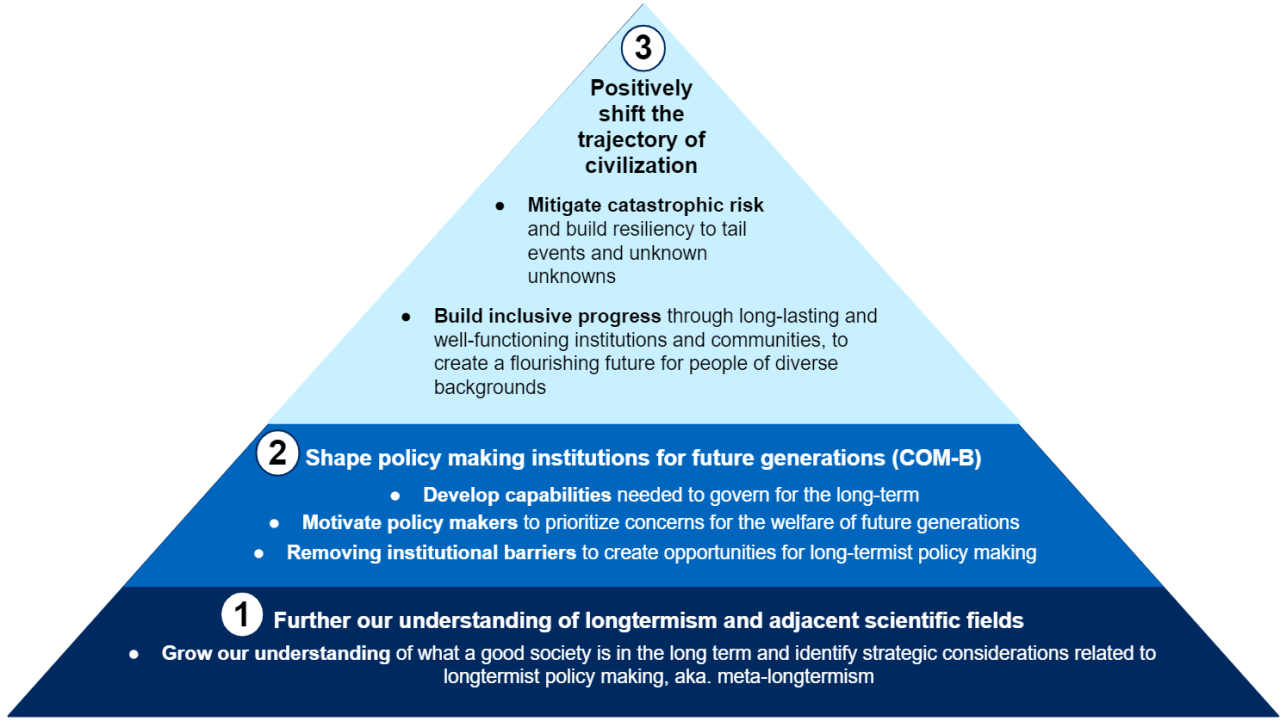
When the object of “moral comparability” is the existence of the human species or the planet, what parts of our lives and means are we left with as a right to keep as our own? More importantly, what acts cannot be justified when the entire world or the entire human legacy is at stake? Singer’s Principle of Sacrifice makes it morally imperative to do what it takes to prevent bad things from happening, so long as nothing of comparable moral value will be lost. To prevent the end of humanity or the world, we are then permitted—even more we are required—to do just about anything.
Righteous Richness

Samuel Bankman-Fried grew up in a maximally affluent environment. He is the son of Joseph Bankman, clinical psychologist and law professor at Stanford University, and Barbara Fried, writer and retired law professor at Stanford. In his youth, he attended elite prep school Crystal Springs Uplands, which today asks $56,620 for annual tuition,87 where he developed an affinity and talent for math early on. His ivory tower parents raised him and his siblings to be “take-no-prisoners utilitarians” 88 and would debate with them around the dinner table about what potential actions would lead to the greatest good for the greatest number.89 One of these debates led SBF to conclude that abortion is not murder, but more akin to birth control, helping him to “resolve some nagging doubts he had about the ethics of abortion. It made him comfortable being pro-choice—as his friends, family, and peers were.” 90
He was an undergraduate studying physics and math at the prestigious Massachusetts Institute of Technology (MIT) when he first encountered Will MacAskill in 2013. By this time, MacAskill’s EA projects were well underway; Giving What We Can (GWWC), 80,000 Hours (80kH), and the Centre for Effective Altruism (CEA) had all been established by 2011. The EAs were now in “movement-building” and marketing mode, hosting events like the “Effective Altruism Summit” in the San-Francisco Bay Area, SBF’s hometown, featuring keynote speakers like Peter Thiel and drawing moderate audiences of mostly fresh-out-of-high-school teens and twenty-something college students.91
At MIT, SBF was part of the “coed fraternity of supergeeks” named Epsilon Theta, through which he was first introduced to EA and then MacAskill.92 The “reluctant prophet of effective altruism” 93 was visiting MIT to proselytize his idea of “earning to give” to those “high-calibre students of elite institutions” and acquire their pledges, and SBF attended his lecture thanks to his fellow Thetans. He was ideally primed to the pitch, a preeminent recruit, an EA prodigy in wait of a guide. Already a utilitarian by virtue of his parentage, he had then become exposed to, and extensively influenced by, Singer’s ideas during his freshman year of college. As mentioned above, Singer “gave birth to the animal rights movement,” 94 so, after encountering his work, SBF stopped eating animal products entirely and went protesting against factory farming. When MacAskill converted SBF to effective altruism and convinced him that the most ethical action SBF could take in life would be to “get filthy rich, for charity’s sake,” MacAskill was simply knocking down what had already been set up.95
From that day forward, MacAskill seems to have served as SBF’s moral minister and personal mentor. The first piece of advice MacAskill gave SBF was to discard the idea of doing “direct work for an organization focused on improving farmed animal welfare.” 96 Instead, he ought to employ the idea of 80kH and pursue a career in maximal money-making. Particularly, MacAskill advised him to intern during the summer of 2013 at the trading firm Jane Street Capital. Shortly thereafter, SBF was hired by MacAskill to serve as the CEA’s US arm’s treasurer from 2013 to 2015. After graduating from MIT in 2014, SBF would return to Jane Street for a full-time job, and by that time he had been added to the CEA’s board.97
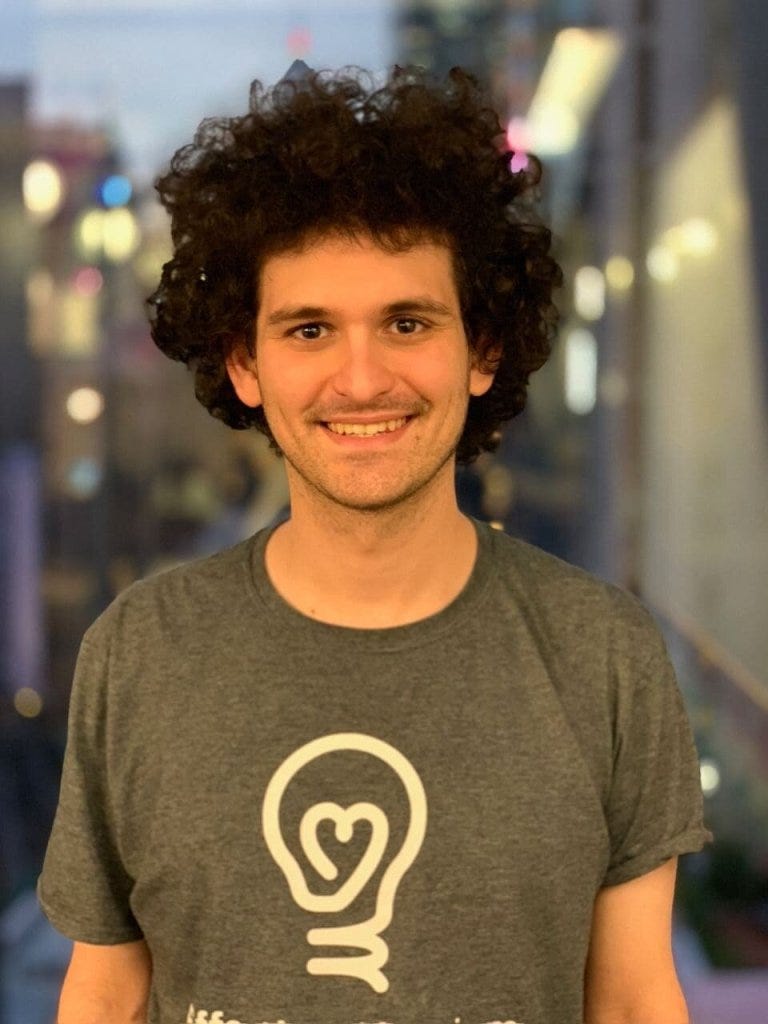
Immediately after becoming employed at Jane Street, SBF started funneling money to MacAskill’s projects with large parts of his income directed to the CEA and 80kH. There, he met other EA devotees like Caroline Ellison and developed lasting friendships with them. He reportedly excelled at the job, but quit and returned to Palo Alto in 2017 because the trades at Jane Street were too “risk averse.” 98 He didn’t want to just be rich, he wanted to become “part of the global elite” with “dynastic wealth” and prodigious power to make the world what he would like it to be.99
So, SBF sought out some risk. That year, he noticed an arbitrage opportunity in trading cryptocurrency and decided to exploit it. For this particular purpose, SBF co-founded Alameda Research with fellow effective altruist Tara MacAuley, then Chief Operating Officer at the CEA.100 They wanted to buy cryptocurrency in the US and sell it to people in South Korea and Japan at a 10% margin but, in order to do so, Alameda needed a Japanese bank account.
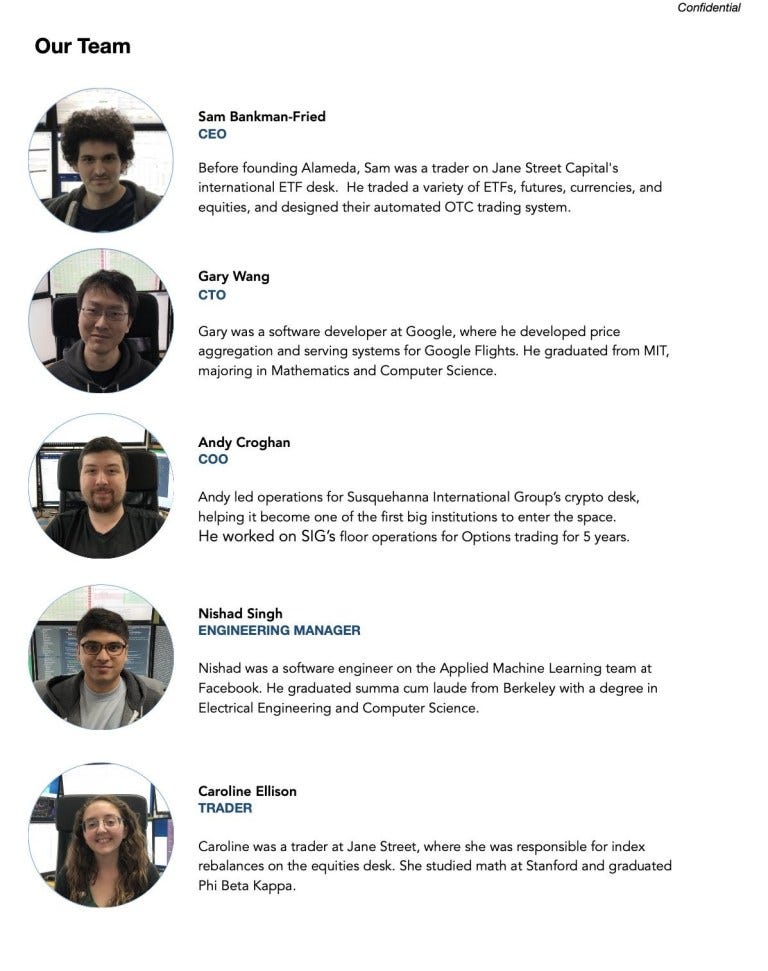
Luckily for SBF and his plan, a Japanese citizen and fellow effective altruist agreed to let him use a bank account he was willing to open for them for processing the transactions, while collecting a fee for himself, of course.101 Now successfully trading, Alameda Research went looking for investment capital and received it from the co-founder of Skype and, again, fellow member of the EA community, Jaan Tallinn.102 SBF recruited 15 more effective altruists to his company including Caroline Ellison and Nishad Singh and continued to exploit the arbitrage trade until it faded, racking up millions of dollars in profits.
Things were looking good for SBF, but things did not look so good to everyone else. In 2018, the CEA and its trustees (one of which, at the time, was SBF himself) were considering ethical allegations against him and his company.103 A year after its founding, Alameda suffered a flight of some of its EA employees,104 including the co-founder Tara MacAulay, who alleged SBF was engaging in poor risk management and bad business ethics. As might be expected, the allegations were dismissed and no action was taken, since the core tenet of EA is to maximize wealth for the purposes of giving it away. In their view, SBF’s actions were supremely ethical. It did not matter how he was making money, but only that he was, and that he was giving it away to the CEA and their interests.
Bankman-Fried, FTX and Alameda Research, among other entities he controlled, helped finance the Oxford-based Centre for Effective Altruism, which is now called the Effective Ventures Foundation, the Britain-based charity network that filed the report with the commission. […] Bankman-Fried’s donations are at least in the multiple millions of dollars with public pledges to give billions more.
Schwartz, Brian. “UK charity backed by disgraced crypto kingpin Sam Bankman-Fried sounds alarm to British regulators after FTX collapse,” CNBC. 11/30/2022. Accessed 02/14/2023. DOI https://www.cnbc.com/2022/11/30/sam-bankman-fried-backed-charity-sounds-alarm-to-uk-regulators-after-ftx-collapse.html
Altruistic Apogee

Here, we arrive at our beginning. Using the remaining profits from Alameda Research, SBF co-founded FTX with fellow effective altruist Gary Wang in 2019 to facilitate trades at a lower cost to Alameda. Binance, that same year, would make its massive, multi-million dollar equity investment. FTX ballooned to monstrous size, reporting $1.02 billion in revenue in 2021, and raising $1.8 billion from investors like BlackRock,105 SoftBank, and Tiger Global 106 in seven total funding rounds over the course of only two to three years.107 SBF moved FTX’s offshore headquarters from Hong Kong to Nassau, Bahamas—home of one of the first central bank digital currencies (CBDC) referred to as the ”sand dollar.”108 He, and his companies, made billions of dollars worth of investments in the crypto industry,109 paid 10-25 effective altruists $10,000 to hang out at his Bahamian mansion for six months,110 and established FTX’s philanthropic and giving arms, the FTX Foundation111 and Future Fund in 2022.112

As you may have foreseen, on the FTX Future Fund team sat William MacAskill,113and in the list of “Areas of Interest” lie all those same subjects the EA community identifies as “the world’s most pressing problems.” As described in a Vox article, the Future Fund was created “to donate money to ‘improve humanity’s long-term prospects’ through the ‘safe development of artificial intelligence, reducing catastrophic biorisk, improving institutions, economic growth,’ and more.”114 It even features Effective Altruism as an area of interest. The list of grants awarded by the future fund includes a $1.5 million grant to a professor at Cornell University to study “alignment theory” (i.e. alignment of AI to human values), a $150k grant to Moncef Slaoui to fund his memoir on directing Operation Warp Speed, a $175k grant to Braden Leach to work on biosecurity at Johns Hopkins Center for Health Security (see: Tom Inglesby), a $10 million grant to HelixNano to support them in their preclinical and phase 1 trials of a “pan-variant” COVID-19 vaccine, and notably a giant $13.94 million grant to the Centre for Effective Altruism for “general support for their activities.” 115
FTX, Alameda, and SBF et. al. spent 2020-2022 spreading money around and buying up praise and influence. They granted funds to media outlets like Vox’s Future Perfect, Semafor, and ProPublica 116, who often published uncritical and often flattering articles about him and EA,117 and spent tens of millions of dollars on political campaigns118 (the largest donations went to Biden’s 2020 Presidential campaign and a PAC supporting Democrat Carrick Flynn, a biosecurity zealot and effective altruist who influenced the White House119 and federal biosecurity law). SBF shared a stage with Tony Blair and Bill Clinton at a crypto conference in the Bahamas to talk about blockchain technology and the Russia/Ukraine war (FTX would later partner directly with the Ukrainian government to convert bitcoin into fiat for “war materiel”). With what seemed like bottomless pockets, SBF was invited to personally visit the White House and spoke with White House officials more than a few times to talk about cryptocurrency policy and regulation.120
Victory Lap
In the end, SBF’s vision became reality. He became one of the “filthy rich” global elite. He was heralded as a “genius” and “savior,” as the “next J.P. Morgan,” and “next Warren Buffett.”121 FTX was featured as one of the World Economic Forum’s partners 122, US politics was his play thing, some of the most influential people in the world, like Tom Brady, Shaquille O’Neal, and Larry David, partnered with him, and his net worth blew up to a high of $21 billion.123 The world was his material and he was applying his form, frictionlessly.

The Effective Altruism movement saw its “key metrics” double in 2021 due to SBF’s success and the explicit and highly emphasized nature of his do-goodery, pushing effective altruism into the mainstream media and, subsequently, public consciousness. The World Economic Forum now features EA as a “social innovation” on their website, and touts how good Singerean morality can be for business. In 2022, SBF signed the Bill and Melinda Gates billionaire’s Giving Pledge, making a public spectacle of it, although only $21.8 million of FTX’s tens of billions of dollars of profits had been donated to charity through its Foundation over the course of at least two years.124 Hastily and without vindication, he, like MacAskill, was bestowed with sainthood.
The hearts and the faith of the common people were captured successfully, as this maximally wealthy and maximally influential “wunderkind” was, apparently, also maximally good. Following in the footsteps of the robber barons like the Rockefellers and Rothschilds, and tech tycoons like Zuckerberg, Musk, and Gates, ahead of him, SBF kept jealousy, envy, and ultimately hatred of his filthy richness at bay by telling people what they wanted to hear. All the while, in the shadows, he exerted his excessive and unseemly power over their lives.
SBF said he was not amassing tens of billions of dollars for himself, he was getting filthy rich to make the world a “better place.” Everybody likes the idea of the world being a better place, especially when what “better place” means is left undefined and ripe for the injection of whatever you think it should mean. Here, at last, came our frizzy-haired savior, with a provocative “new” philosophy called effective altruism, to relieve the suffering of the masses. The world could go back to sleep, and it did so promptly and deeply.

Excommunication

In the end, SBF’s scheme worked until it didn’t. As mentioned at the start, improvidential market forces erased his fortune despite his billion-dollar grip. In a panic, it seems, SBF made the both business and moral decision to use his company’s customer funds to keep his maximal money machine running, ignoring his promise to customers and risking their livelihoods. If SBF was a true believer in MacAskill and effective altruism, he could make the argument that his choice was a morally appropriate one given the ethical principles of his philosophy.
If SBF believed what he told everyone, then he thought the whole world was at stake. The planet and the human race were being threatened with annihilation by climate change, unfriendly AI, or whatever, and he had the opportunity to save us all through his god-sized charitable giving and influence. The badness of using $8-$10 billion of other people’s money without their permission, and potentially losing it all, would not be of comparable moral significance. In this case, according to EA, SBF was compelled to do what he did. He was bound by duty to do all in his power to maximize his wealth so he could save the world and that could not be done if his companies went bankrupt. He made a risky bet with good intentions, but simply ran into bad luck. His bet turned out to be a bad one, his methods were underhandedly exposed, his friends abandoned him, his customers took flight, and the floor of SBF’s sky castle disappeared beneath his sandaled feet. In this case, SBF might be left, at least, with a clean conscience on the descent. However, we have reason to dismiss such a tragic story of undeserved misfortune for our main character.

In what SBF thought was a private conversation, he admits to Vox reporter Kelsey Piper that a large part, if not all, of it—effective altruism, the foundation, his desire to make the world a “better place”—was pretense or facade, and he made it clear that there is a big difference between appearance and reality.125 There is the perception of people as good and bad, and there are actually good and bad people, and these get confused. “Some of this decade’s greatest heroes will never be known,” he told Piper, “and some of its most beloved people are basically shams.” What people really care about, he argues, is winning. And by winning, SBF means money.
Naturally, Piper asks, “so the ethics stuff – mostly a front? People will like you if you win [make money] and hate you if you lose and that’s how it all really works?” SBF responds affirmatively and elaborates, “the worst quadrant is ‘sketchy + lose’” and “the best is win + ???” Instead of making “win + clean” the ideal quadrant in his ethical map, he leaves it open for both “sketchy” and “clean.” How he made money did not matter much to this consequentialist, but being perceived as an ethically sound guy did because it made making money easier. Anyway, what is the harm of just pretending to care?

“You were really good at talking about ethics,” Piper follows up, “for someone who kind of saw it all as a game with winners and losers.” SBF puerilely replies, “ya. Hehe. I had to be. It’s what reputations are made of, to some extent.” Without a reputation laundered by the superficial philosophical saintliness of MacAskill’s effective altruism, SBF wouldn’t have been able to do what he did. In fact, EA made everything he did possible. It pointed him to Jane Street, made arbitrage trading with Japan and South Korea possible at Alameda, served as the source of funding and man power that kept Alameda afloat, which without Alameda there would be no FTX. All the while, the sheen of EA combined with billions of dollars blinded regulators and investors, and even the CEA itself, to the unethical business practices of SBF.
Certainly, I’m convinced, fewer people would have invested, traded, or stored their money with FTX had it not been psychologically and emotionally associated with what people think of as goodness. In that way, there is harm—potentially massive harm—done when people like SBF pretend to be the messiah everyone wants them to be. Misplaced faith, in this case at least, left a $8-10 billion crater in the global economy and US politics and policies were irrevocably changed to reflect the values and likeness of an inconsiderate, calculating fraudster.
Just as he said, some of the most beloved people are basically shams, and it was effective altruism that allowed SBF to pull off one of the biggest shams in US history. At least he says he feels sorry for it, though.“I feel bad for those who get fucked by it,” he told Piper, “by this dumb game we woke westerners play where we say all the right shiboleths [sic] and so everyone likes us.” It was, however, a dumb game he was dedicated to playing. One in which some money and the use of the right shibboleths—phrases or words that distinguish one group from another, serve as self-identifiers, or signal loyalty and affinity126—are all you need to rule the world. A world in which kindness and benevolence do and ought to exist, and a world which, if we are honest, does not need saving.
If everyone saves themselves, who will need salvation?
What the world needs are fully-developed, critically thinking, and autonomous individuals who are free to think, debate, and disagree about their values. The world and society at large benefit, even if in a secondary or symptomatic way, by being composed of self-interested yet considerate people who are capable of generating their own moral principles (e.g. principle of non-violence). Individuals like this operate with integrity, practice intellectual self-defense, and are not susceptible to the enchantments of fear-mongerers, fraudsters, con artists, or moral charlatans. If you are looking for a place to start, or have family or friends who could benefit, I recommend checking out the following resources:
Tony Myers’ Logic and Trivium Courses
Trivium (Grammar, Logic, and Rhetoric):
https://marketplace.autonomyagora.com/a/2147529024/biUUkexH
Will Durant’s Story of Philosophy (masterful and readable history of philosophy)
https://www.simonandschuster.com/books/Story-of-Philosophy/Will-Durant/9780671201593
Watch Grand Theft World for historical analysis and a critical look at the week’s news, and join the community to hang out online and in real life with likeminded people! GrandTheftWorld.com
And of course, stay up to date with events as they unfold with objective analysis at TheLastAmericanVagabond.com
If you have questions, comments, or just want to connect you can email me at mmbannon@protonmail.com or follow me on twitter @llspacejellyll
Note: My writings are my best representation of the publicly available news and information on the internet. I encourage my readers to do their own research and come to their own conclusions as I am a person and am unfortunately, not infallible.
Edit: 4/2/23
I made some edits to make my writing more clear and accurate and my conjecture more obvious.
Note to the Readers:
Thank you for your ongoing support of The Last American Vagabond. TLAV is a Value-For-Value experience. We want to invite you to subscribe to our Substack for as little as $5/month to join the discussion, comment on posts, join the TLAV Roundtable Discussions and feel good about supporting alternative media that you value. Upgrade to the Founding Member Level for the opportunity to have a monthly Q&A with Ryan as well. Thank you to all of you who already support TLAV in all the various ways that you do with your time, talent and treasure.
Footnotes
1
2 Webb, Whitney. “The Network Behind FTX with Marty Bent and Michael Krieger.” Unlimited Hangout. Published 11/22/2022. https://unlimitedhangout.com/2022/11/resources/show-notes/the-network-behind-ftx-with-marty-bent-and-michael-krieger/
3
4 Browne, Ryan. “Cryptocurrency exchange FTX hits $32 billion valuation despite bear market fears.” CNBC, Tech. 01/31/2022. https://www.cnbc.com/2022/01/31/crypto-exchange-ftx-valued-at-32-billion-amid-bitcoin-price-plunge.html
5 Redman, Jamie. “Analysis of FTX and Alameda Collapse Points to Terra LUNA Fallout Starting the Domino Effect.” Bitcoin.com, NEWS. 11/18/2022. https://news.bitcoin.com/analysis-of-ftx-and-alameda-collapse-points-to-terra-luna-fallout-starting-the-domino-effect/
6 Ashmore, Dan. “Who is Changpeng Zhao?” Forbes Advisor. 01/05/2023. https://www.forbes.com/advisor/investing/cryptocurrency/who-is-changpeng-zhao/
7 Levine, Matt. “FTX’s BlockFi Rescue Didn’t Work.” Bloomberg, Opinion. 11/28/2022. https://www.bloomberg.com/opinion/articles/2022-11-28/ftx-s-blockfi-rescue-didn-t-work?leadSource=uverify%20wall
8 Roberts, Daniel. “The Crypto Bailouts Have Begun. Is This the Only Way?” Decrypt, Opinion. 07/10/2022. https://decrypt.co/104807/bitcoin-bailouts-sbf-ftx-cz-binance-blockfi-voyager
9 Radmilac, Andjela. “Celsius bankruptcy filing shows its biggest creditor has ties to Alameda Research.” CryptoSlate, Bankruptcy. 07/15/2022. https://cryptoslate.com/celsius-bankruptcy-filing-shows-its-biggest-creditor-has-ties-to-alameda-research/
10 Evans, Brian. “Sam Bankman-Fried secretly transferred FTX customer funds to Alameda Research after his trading firm suffered losses in the spring, report says.” Markets Insider, Currencies. 11/10/2022. https://markets.businessinsider.com/news/currencies/ftx-crash-client-funds-alameda-binance-sbf-sec-cftc-probe-2022-11
11

12 Huang, V., Osipovich, A., Kowsmann, P. “FTX Tapped Into Customer Accounts to Fund Risky Bets, Setting Up Its Downfall.” The Wall Street Journal. 11/10/2022.
Evans, Brian. “Sam Bankman-Fried secretly transferred FTX customer funds to Alameda Research after his trading firm suffered losses in the spring, report says.” Markets Insider, Currencies. 11/10/2022. https://markets.businessinsider.com/news/currencies/ftx-crash-client-funds-alameda-binance-sbf-sec-cftc-probe-2022-11
13 Tortorelli, Paige. “Sam Bankman-Fried’s Alameda quietly used FTX customer funds for trading, say sources.” CNBC, CNBC Investigations. 11/13/2022. https://www.cnbc.com/2022/11/13/sam-bankman-frieds-alameda-quietly-used-ftx-customer-funds-without-raising-alarm-bells-say-sources.html
14
15 Allison, Ian. “Divisions in Sam Bankman-Fried’s Crypto Empire Blur on His Trading Titan Alameda’s Balance Sheet.” CoinDesk, Business. 11/02/2022. https://www.coindesk.com/business/2022/11/02/divisions-in-sam-bankman-frieds-crypto-empire-blur-on-his-trading-titan-alamedas-balance-sheet/
16 Brown, Lane. “What H-A-P-P-E-N-E-D?” New York Magazine, Intelligencer. 11/19/2022. https://nymag.com/intelligencer/article/sam-bankman-fried-ftx-bankruptcy-what-happened.html
17

Kharif, Olga. “Binance To Sell $529 Million of Bankman-Fried-Fried’s FTT Token.” Bloomberg, Technology. 11/6/2022. https://www.bloomberg.com/news/articles/2022-11-06/binance-to-sell-529-million-of-ftt-token-amids-revelations
18 Huang, V., Osipovich, A., Kowsmann, P. “FTX Tapped Into Customer Accounts to Fund Risky Bets, Setting Up Its Downfall.” The Wall Street Journal. 11/10/2022.
19

20

21 Pereira, Ana Paula. “Alameda Research withdrew $204M ahead of bankruptcy filing: Arkham Intelligence.” 11/26/2022. https://cointelegraph.com/news/alameda-research-withdrew-204m-ahead-of-bankruptcy-filing-arkham-intelligence
22 U.S. Attorney’s Office, Southern District of New York. “United States Attorney Announces Charges Against FTX Founder Samuel Bankman-Fried.” The Department of Justice, Press Release. 12/13/2022. https://www.justice.gov/usao-sdny/pr/united-states-attorney-announces-charges-against-ftx-founder-samuel-bankman-fried
23 Melinek, Jacquelyn. “Former FTX CEO SBF pleads not guilty to US criminal charges.” TechCrunch, Crypto. 1/03/2023. https://techcrunch.com/2023/01/03/ftx-former-ceo-sbf-pleads-not-guilty-to-u-s-criminal-charges/
24 Ibid.
25 Attlee, David. “SBF stays at parents’ house on a $250 million bail: Law Decoded, Dec. 19-26” CoinTelegraph. 12/26/2022. https://cointelegraph.com/news/sbf-stays-at-parents-house-on-a-250-million-bail-law-decoded-dec-19-26
26 Stanford Encyclopedia of Philosophy. “Altruism.” 08/25/2016, revised 08/31/2020. Accessed 02/15/2023. https://plato.stanford.edu/entries/altruism/
27 Webb, Whitney. “The Network Behind FTX with Marty Bent and Michael Krieger.” Unlimited Hangout. 11/22/2022. https://unlimitedhangout.com/2022/11/resources/show-notes/the-network-behind-ftx-with-marty-bent-and-michael-krieger/
28


EA Forum. “Elon Musk.” Effective Altruism Forum. Accessed February 2023. https://forum.effectivealtruism.org/topics/elon-musk
Kullish, N. “How a Scottish Moral Philosopher Got Elon Musk’s Number.” The New York Times. 10/8/2022. https://www.nytimes.com/2022/10/08/business/effective-altruism-elon-musk.html
29 Gertler, Aaron. “The most successful EA podcast of all time: Sam Harris and Will MacAskill (2020).” Effective Altruism Forum. 07/3/2021. https://forum.effectivealtruism.org/posts/hd2LeisjAmzdJdGb3/the-most-successful-ea-podcast-of-all-time-sam-harris-and
30 Matthews, Dylan. “How effective altruism went from a niche movement to a billion-dollar force.” Vox, Future Perfect, 08/08/2022. https://www.vox.com/future-perfect/2022/8/8/23150496/effective-altruism-sam-bankman-fried-dustin-moskovitz-billionaire-philanthropy-crytocurrency
31 Dixon-Luinenburg, Miranda, Matthews, Dylan. “Carrick Flynn may be 2022’s unlikeliest candidate. Here’s why he’s running.” Vox. 5/14/2022. https://www.vox.com/23066877/carrick-flynn-effective-altruism-sam-bankman-fried-congress-house-election-2022
32 Brown, Joukowsky “Internalized Authority and the Prison of the Mind: Bentham and Foucault’s Panopticon.” Institute for Archeology, 13 Things. 2009. https://www.brown.edu/Departments/Joukowsky_Institute/courses/13things/7121.html
33 “The History of Utilitarianism.” Stanford Encyclopedia of Philosophy. 3/27/2009, revised 9/22/2014. https://plato.stanford.edu/entries/utilitarianism-history/
Free PDF of Bentham’s collected works: https://books.googleusercontent.com/books/content?req=AKW5QafcyvViFgQPyjXqjw7t686fvZfgCZoO5CERpcC9ZEWVTcXZc7M2y8IuwCct6XxqsqhncbujAoZxdamj29cNdhgltoH8M_K-xr1U7LC7LdFpfjt8xYKycwoQitT2Ls3HrgJBFshJpygk_FO0ALK61g89I7ZCXNt_3N-ZEvMuk8MN7uSLeRv0lPvfHp2nAC94oXxGxmUHtIoNDe967EMUkLHaPY–E2pBqVfyXDllJLRABo4yVDSDlKG0NKWoe_YHlblswqubuB0HmKXP73OqojkY7xbR5g
34 Sweet, William. “Jeremy Bentham (1748-1832)” Internet Encyclopedia of Philosophy. Accessed February 2023. https://iep.utm.edu/jeremy-bentham/
35 Bentham, Jeremy, 1789 [PML]. An Introduction to the Principles of Morals and Legislation., Oxford: Clarendon Press, 1907.
Mill, John Stuart, 1861 [U]. Utilitarianism, Roger Crisp (ed.), Oxford: Oxford University Press, 1998.
36 Sweet, William. “Jeremy Bentham (1748-1832)” Internet Encyclopedia of Philosophy, paragraph 4. Accessed February 2023. DOI https://iep.utm.edu/jeremy-bentham/
37 Note: To make the thought experiment even more fun, consider the chance that those people saved by the organ transplants go on to be criminals. Imagine they go on to murder one person each. Is the action of chopping up the hermit then judged to be bad? What if they derive more pleasure out of murdering people than the suffering caused by the murders? Then would chopping up the hermit be an even greater good? You see how it can go sideways very quickly.
38 “Objections to Utilitarianism.” PhilPapers, Bibliography. Accessed February 2023. https://philpapers.org/browse/objections-to-utilitarianism
39 Mill, J. S. (2006). Autobiography. In J. M. Robson & J. Stillinger (Eds.), Collected Works of John Stuart Mill (Vol. 1, pp. 145–147). essay, Liberty Fund.
40 Fletcher, Ronald, Elmer Barnes, Harry. “Auguste Comte.” Britannica, Philosophers. 1/15/2023. https://www.britannica.com/biography/Auguste-Comte
41 This is disputed but, ultimately, not of any importance.
42 Feigl, Herbert. “positivism.” Britannica, Philosophical Issues. 12/26/2022. https://www.britannica.com/topic/positivism
New World Encyclopedia Contributors, “Positivism (philosophy)” New World Encyclopedia. 11/20/2022. https://www.newworldencyclopedia.org/entry/Positivism_(philosophy)
Hughes, Glen. “Auguste Comte A Course in Positive Philosophy.” Squashed Philosophers. 12/20/2019. http://sqapo.com/comte.htm
43 Golub, C. (2014). Altruism: A Natural Thought History of an Idea. Retrieved January 22, 2023, from https://repository.wellesley.edu/object/ir503
44 The Editors of Encyclopedia Britannica, “phrenology.” Britannica, religious beliefs. 1/26/2023. https://www.britannica.com/topic/phrenology
45 Golub, C. (2014). Altruism: A Natural Thought History of an Idea. Retrieved January 22, 2023, from https://repository.wellesley.edu/object/ir503
46 Ibid.
47 Hughes, Glen. “Auguste Comte A Course in Positive Philosophy.” Squashed Philosophers. 12/20/2019. http://sqapo.com/comte.htm
48 Golub, C. (2014). Altruism: A Natural Thought History of an Idea. Retrieved January 22, 2023, from https://repository.wellesley.edu/object/ir503
49 Mangone, E. (2022). Pitirim A. Sorokin y la reconstrucción de la humanidad. Revista Centra de Ciencias Sociales, 1(1), 11-28. https://doi.org/10.54790/rccs.12 (my emphasis)
50 Sorokin, P. A. (1954). Forms and Techniques of Altruistic and Spiritual Growth. Boston, Mass.: Beacon Press.
51 Kraut, Richard. ”Altruism”, The Stanford Encyclopedia of Philosophy (Fall 2020 Edition), Edward N. Zalta (ed.), DOI https://plato.stanford.edu/entries/altruism/#MixeMotiPureAltr
52 “Considerate.” Merriam-Webster.com Dictionary, Merriam-Webster, Accessed 2/15/2023. DOI https://www.merriam-webster.com/dictionary/considerate
53 Rand, Ayn. Faith and Force: The Destroyers of the Modern World, PWNI, 74; pb 61.
Quote found in:
Rand, A. (1988). A: Altruism. In H. Binswanger (Ed.), The Ayn Rand Lexicon: Objectivism from A to Z (pp. 4–5). essay, Penguin Books.
54 Lewis-Kraus, Gideon. “The Reluctant Prophet of Effective Altruism.” The New Yorker, Annals of Inquiry. 08/08/2022. https://www.newyorker.com/magazine/2022/08/15/the-reluctant-prophet-of-effective-altruism.
55 MacAskill, William. “The history of the term ‘effective altruism’.” Effective Altruism Forum. 03/10/2014. https://forum.effectivealtruism.org/posts/9a7xMXoSiQs3EYPA2/the-history-of-the-term-effective-altruism
56 Note: The Centre for Effective Altruism (as an umbrella organization) has recently undergone a name change and is now called the “Effective Ventures Foundation.” The Centre for Effective Altruism remains as a “project” of the Effective Ventures Foundation.
57 MacAskill, William. “The history of the term ‘effective altruism’.” Effective Altruism Forum. 03/10/2014. https://forum.effectivealtruism.org/posts/9a7xMXoSiQs3EYPA2/the-history-of-the-term-effective-altruism
58 Lewis-Kraus, Gideon. “The Reluctant Prophet of Effective Altruism.” The New Yorker, Annals of Inquiry. 08/08/2022. https://www.newyorker.com/magazine/2022/08/15/the-reluctant-prophet-of-effective-altruism.
And
“About us.” Giving What We Can. Accessed February 2023. https://www.givingwhatwecan.org/about-us
“The idea of Giving What We Can came to Oxford philosopher Toby Ord after he was inspired by ethicists such as Peter Singer to pledge a significant proportion of his income to effective charities.”
Ord, Toby. “Global poverty and the demands of morality.” Pre-print, J Perry (ed.) God, The Good, and Utilitarianism: Perspectives on Peter Singer, (Cambridge: CUP), 177–91, 2014 https://www.fhi.ox.ac.uk/wp-content/uploads/Global-Poverty-and-the-Demands-of-Morality-1.pdf
59 Peter Singer, 1972. ‘Famine, Affluence, and Morality’, Philosophy and Public Affairs 1:229–243. P. 231.
60 Note: A comment along these lines was made by MacAskill in an interview with Lex Fridman. The interview appears to have been since been deleted from Fridman’s Twitter and archives.
61 Peter Singer, 1972. ‘Famine, Affluence, and Morality’, Philosophy and Public Affairs 1:229–243.
62 Ibid; p. 232
63 Lewis-Kraus, Gideon. “The Reluctant Prophet of Effective Altruism.” The New Yorker, Annals of Inquiry. 08/08/2022. https://www.newyorker.com/magazine/2022/08/15/the-reluctant-prophet-of-effective-altruism.
Quote:
“If Peter Singer’s theory—that any expenditure beyond basic survival was akin to letting someone die—was simply too taxing to gain wide adherence, it seemed modest to ask people to give ten per cent of their income.”
64 Ibid; p. 235
65 “The Limits to Growth.” Club of Rome. Accessed February 2023. DOI https://www.clubofrome.org/publication/the-limits-to-growth/
66 Peter Singer, 1972. ‘Famine, Affluence, and Morality’, Philosophy and Public Affairs 1:229–243. P. 240.
67 Peter Singer, 1972. ‘Famine, Affluence, and Morality’, Philosophy and Public Affairs 1:229–243. P. 242.
68 Specter, Michael. “The Dangerous Philosopher,” The New Yorker. 09/06/1999. Accessed February 2023. DOI http://www.benegg.net/_private/Specter.pdf
69 Hentoff, Nat. “A Professor Who Argues for Infanticide,” Washington Post, 09/11/1999. https://www.washingtonpost.com/archive/opinions/1999/09/11/a-professor-who-argues-for-infanticide/cce7dc81-3775-4ef6-bfea-74cd795fc43f/
70 Ibid. Quotes from Peter Singer’s Practical Ethics, pulled from the article.
71 Specter, Michael. “The Dangerous Philosopher,” The New Yorker. 09/06/1999. http://www.benegg.net/_private/Specter.pdf
Note:
In this quote Singer uses hemophilia as the disability as an example. I have replaced hemophiliac with disabled to promote clarity for my purpose.
72 Ibid.
73 Ibid.
74 Piper, Kelsey. “What philosopher Peter Singer has learned in 45 years of advocating for animals.” Vox, Future Perfect. 10/27/2020. https://www.vox.com/future-perfect/2020/10/27/21529060/animal-rights-philosopher-peter-singer-why-vegan-book
75 “Our pledge” Giving What We Can. Accessed February 2023. https://www.givingwhatwecan.org/pledge
76 This citation has been removed from Giving What We Can. Its existence can be proved at Archive.Today: https://archive.is/Ftne1
Todd, Benjamin. “Earning to give in a high-paying role, such as quantitative trading.” 80,000 Hours, career reviews. 10/2021. https://80000hours.org/career-reviews/earning-to-give-in-a-high-paying-role/
77 “Doing Good Better.” Effective Altruism Forum. Accessed February 2023. https://www.effectivealtruism.org/doing-good-better
78
79 “Centre for Effective Altruism.” Home page. Accessed February 2023. https://www.centreforeffectivealtruism.org
80 “Effective Altruism.” Effective Altruism Home Page. Accessed February 2023. https://www.effectivealtruism.org
81 Todd, Benjamin. “Want to do good? Here’s how to choose an area to focus on.” 80,000 Hours, Career guide. 4/2016, revised 3/2017. https://80000hours.org/career-guide/most-pressing-problems/
82 Lewis-Kraus, Gideon. “The Reluctant Prophet of Effective Altruism.” The New Yorker, Annals of Inquiry. 08/08/2022. https://www.newyorker.com/magazine/2022/08/15/the-reluctant-prophet-of-effective-altruism.
83 “What is effective altruism?” EffectiveAltruism.org, articles. Accessed February 2023. https://www.effectivealtruism.org/articles/introduction-to-effective-altruism
84 Webb, Whitney. “The Network Behind FTX with Marty Bent and Michael Krieger.” Unlimited Hangout. 11/22/2022. https://unlimitedhangout.com/2022/11/resources/show-notes/the-network-behind-ftx-with-marty-bent-and-michael-krieger/
Matthews, Dylan. “How effective altruism went from a niche movement to a billion-dollar force.” Vox, Future Perfect. 08/08/2022. https://www.vox.com/future-perfect/2022/8/8/23150496/effective-altruism-sam-bankman-fried-dustin-moskovitz-billionaire-philanthropy-crytocurrency
85 ”Space.” World Economic Forum. Accessed February 2023. https://www.weforum.org/communities/gfc-on-space
Goy, A, et al. “Health and Healthcare in the Fourth Industrial Revolution Global Future Council on the Future of Health and Healthcare 2016-2018.” World Economic Forum, Insights. April 2019. https://www3.weforum.org/docs/WEF__Shaping_the_Future_of_Health_Council_Report.pdf
“Climate Change.” World Economic Forum. Accessed February 2023. https://www.weforum.org/topics/climate-change
“Artificial Intelligence.” World Economic Forum. Accessed February 2023. https://www.weforum.org/topics/artificial-intelligence-and-robotics
Todd, Benjamin. “Which problems in the world are the most pressing to solve?” 80,000 Hours, world problems. 03/2017, updated 5/2020. https://80000hours.org/career-guide/world-problems/
86 Ibid.
87 “Tuition & Fees.” Crystal Springs Uplands School. Accessed February 2023. https://www.csus.org/admission/affording-crystal
This citation has been deleted. Its existence can be proved at Archive.Today: https://archive.ph/qFJJN
Fisher, Adam. “Sam Bankman-Fried Has a Savior Complex—And Maybe You Should Too.” Sequoia. 09/22/2022. https://www.sequoiacap.com/article/sam-bankman-fried-spotlight/.
88 “Sam Bankman-Fried.” EA Forum. Accessed February 2023. https://forum.effectivealtruism.org/topics/sam-bankman-fried
This citation has been deleted. Its existence can be proved at Archive.Today: https://archive.ph/qFJJN
Fisher, Adam. “Sam Bankman-Fried Has a Savior Complex—And Maybe You Should Too.” Sequoia. 09/22/2022. https://www.sequoiacap.com/article/sam-bankman-fried-spotlight/.
90 Ibid.
91
Setiya, Kieran. “The New Moral Mathematics.” Boston Review, Philosophy. 8/15/2022. Accessed 2/15/2022. https://www.bostonreview.net/articles/the-new-moral-mathematics/
92 This citation has been deleted. Its existence can be proved at Archive.Today: https://archive.ph/qFJJN
Fisher, Adam. “Sam Bankman-Fried Has a Savior Complex—And Maybe You Should Too.” Sequoia. 09/22/2022. https://www.sequoiacap.com/article/sam-bankman-fried-spotlight/.
93 Lewis-Kraus, Gideon. “The Reluctant Prophet of Effective Altruism.” The New Yorker, Annals of Inquiry. 08/08/2022. https://www.newyorker.com/magazine/2022/08/15/the-reluctant-prophet-of-effective-altruism.
94 Specter, Michael. “The Dangerous Philosopher,” The New Yorker. 09/06/1999. Accessed 02/14/2023. http://www.benegg.net/_private/Specter.pdf
95 Ibid.
96 “Sam Bankman-Fried.” EA Forum. Accessed February 2023. DOI https://forum.effectivealtruism.org/topics/sam-bankman-fried
97 Schwartz, Brian. “UK charity backed by disgraced crypto kingpin Sam Bankman-Fried sounds alarm to British regulators after FTX collapse.” CNBC. 11/30/2022. https://www.cnbc.com/2022/11/30/sam-bankman-fried-backed-charity-sounds-alarm-to-uk-regulators-after-ftx-collapse.html
98 This citation has been deleted. Its existence can be proved at Archive.Today: https://archive.ph/qFJJN
Fisher, Adam. “Sam Bankman-Fried Has a Savior Complex—And Maybe You Should Too.” Sequoia. 09/22/2022. https://www.sequoiacap.com/article/sam-bankman-fried-spotlight/.
99 Ibid.
100 Albergotti, R., Matsakis, L. “Effective Altruism group debated Sam Bankman-Fried’s ethics in 2018.” Semafor. 11/18/2022. https://www.semafor.com/article/11/18/2022/effective-altruism-group-debated-sam-bankman-frieds-ethics-in-2018
101 This citation has been deleted. Its existence can be proved at Archive.Today: https://archive.ph/qFJJN
Fisher, Adam. “Sam Bankman-Fried Has a Savior Complex—And Maybe You Should Too.” Sequoia. 09/22/2022. https://www.sequoiacap.com/article/sam-bankman-fried-spotlight/.
102 Ibid.
103 Ibid.
104

105 Wang, Nelson. “BlackRock CEO Larry Fink Says Firm Invested $24M in FTX: Reuters.” CoinDesk, Business. 11/30/2022. https://www.coindesk.com/business/2022/11/30/blackrock-ceo-says-firm-had-invested-24-million-in-ftx-reuters/
106 Rooney, Kate. “FTX in talks to raise up to $1 billion at valuation of about $32 billion, in-line with prior round.” CNBC, Tech. 9/21/2022. https://www.cnbc.com/2022/09/21/ftx-in-talks-to-raise-1-billion-at-valuation-of-about-32-billion.html
107 “FTX (financials)” Crunchbase. Accessed February 2023. https://www.crunchbase.com/organization/ftx-exchange/investor_financials
108 Hoffman, L., Saacks, B., Matsakis, L. “Before deal with rival, FTX scoured Wall Street, Silicon Valley billionaires for $1 billion lifeline.” Semafor. 11/8/2022. https://www.semafor.com/article/11/08/2022/before-deal-with-rival-ftx-scoured-wall-street-silicon-valley-billionaires-for-1-billion-lifeline
109 Ibid.
110 Matthews, Dylan. “How effective altruism went from a niche movement to a billion-dollar force.” Vox, Future Perfect. 08/08/2022. https://www.vox.com/future-perfect/2022/8/8/23150496/effective-altruism-sam-bankman-fried-dustin-moskovitz-billionaire-philanthropy-crytocurrency
111 This citation has been deleted. Its existence can be proved at Archive.Today: https://archive.ph/wOkTf
“FTX Foundation.” FTX Foundation. Accessed February 2023 at Archive.Today. https://ftxfoundation.org/
112 This citation has been deleted. Its existence can be proved at Archive.Today: https://archive.ph/1qmEs
“About” Future Fund. Accessed February 2023 at Archive.Today. https://ftxfuturefund.org/about/
113 Ibid.
114 Matthews, Dylan. “How effective altruism went from a niche movement to a billion-dollar force.” Vox, Future Perfect. 08/08/2022. https://www.vox.com/future-perfect/2022/8/8/23150496/effective-altruism-sam-bankman-fried-dustin-moskovitz-billionaire-philanthropy-crytocurrency
115 “HelixNano.” Helix Nanotechnologies, Inc. Accessed February 2023. https://www.helixnano.com
This citation has been deleted. Its existence can be proved at Archive.Today: https://archive.ph/JveJY
“Our Grants, Investments, and Regrants.” Future Fund. Accessed February 2023 at Archive.Today. https://ftxfuturefund.org/all-grants/
116 Soave, Robby. “Did Sam Bankman-Fried’s Millions Buy the Media’s Loyalty?” Reason, cryptocurrencies. 11/21/2022. https://reason.com/2022/11/21/sam-bankman-fried-journalism-funding-crypto-fraud-media/
117 Matthews, Dylan. “How effective altruism went from a niche movement to a billion-dollar force.” Vox, Future Perfect. 08/08/2022. https://www.vox.com/future-perfect/2022/8/8/23150496/effective-altruism-sam-bankman-fried-dustin-moskovitz-billionaire-philanthropy-crytocurrency
118 Mansfield, E., Slack, D. “Sam Bankman-Fried’s political donations totals millions. FTX could sue to recover them.” USA Today. 12/16/2022. https://www.usatoday.com/story/news/politics/2022/12/16/ftx-reclaims-sam-bankman-fried-political-donations/10902327002/
119 Dixon-Luinenburg, M., Matthews, D. “Carrick Flynn may be 2022’s unlikeliest candidate. Here’s why he’s running.” Vox. 5/14/2022. https://www.vox.com/23066877/carrick-flynn-effective-altruism-sam-bankman-fried-congress-house-election-2022
120 Nava, Victor. “White House officials met with Sam Bankman-Fried four times this year: report.” New York Post, News. 12/30/2022. https://nypost.com/2022/12/30/white-house-officials-met-with-sam-bankman-fried-four-times-this-year/
Wingrove, J., Versprille, A. “Bankman-Fried Met With White House Aides on Crypto Policy Before FTX Collapse.” Bloomberg, Politics. 12/292022. https://www.bloomberg.com/news/articles/2022-12-29/bankman-fried-met-white-house-aides-in-pre-collapse-crypto-push
121 Ongweso Jr., E., Pearson, J., and Strachan, M. “Sam Bankman-Fried Was Supposed to Be Different. He Wasn’t.” Vice, Motherboard. 11/10/2022. https://www.vice.com/en/article/dy7epm/sam-bankman-fried-was-supposed-to-be-different-he-wasnt
122 This citation has been deleted. Its existence can be proved at WayBakMachine: https://web.archive.org/web/20221110040924mp_/https://www.weforum.org/organizations/ftx
“FTX.” World Economic Forum. Accessed February 2023 at WayBackMachine. https://www.weforum.org/organizations/ftx
123 Silverman, Sam. “Who Is FTX Founder Sam Bankman-Fried and What Did He Do? Everything You Need to Know About the Disgraced Crypto King.” Originally published 12/22/2023, republished 1/19/2023. https://www.entrepreneur.com/business-news/who-is-ftxs-sam-bankman-fried-net-worth-arrest-and-more/441506
“Sam Bankman-Fried.” Forbes, profile. Accessed February 2023 https://www.forbes.com/profile/sam-bankman-fried/?sh=63b53b234449
124 Wang, Tracy. “FTX Founder Sam Bankman-Fried Signs Billionares’ Giving Pledge.” CoinDesk, Business. 6/1/2022. https://www.coindesk.com/business/2022/06/01/ftx-founder-sam-bankman-fried-signs-billionaires-giving-pledge/
125 Piper, Kelsey. “Sam Bankman-Fried tries to explain himself.” Vox, Future Perfect. 11/16/2022. https://www.vox.com/future-perfect/23462333/sam-bankman-fried-ftx-cryptocurrency-effective-altruism-crypto-bahamas-philanthropy
126 “Shibboleth.” Wikipedia. Accessed 2/15/2023. DOI https://en.wikipedia.org/wiki/Shibboleth





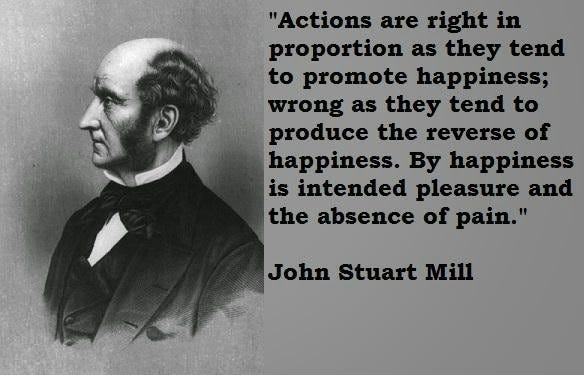





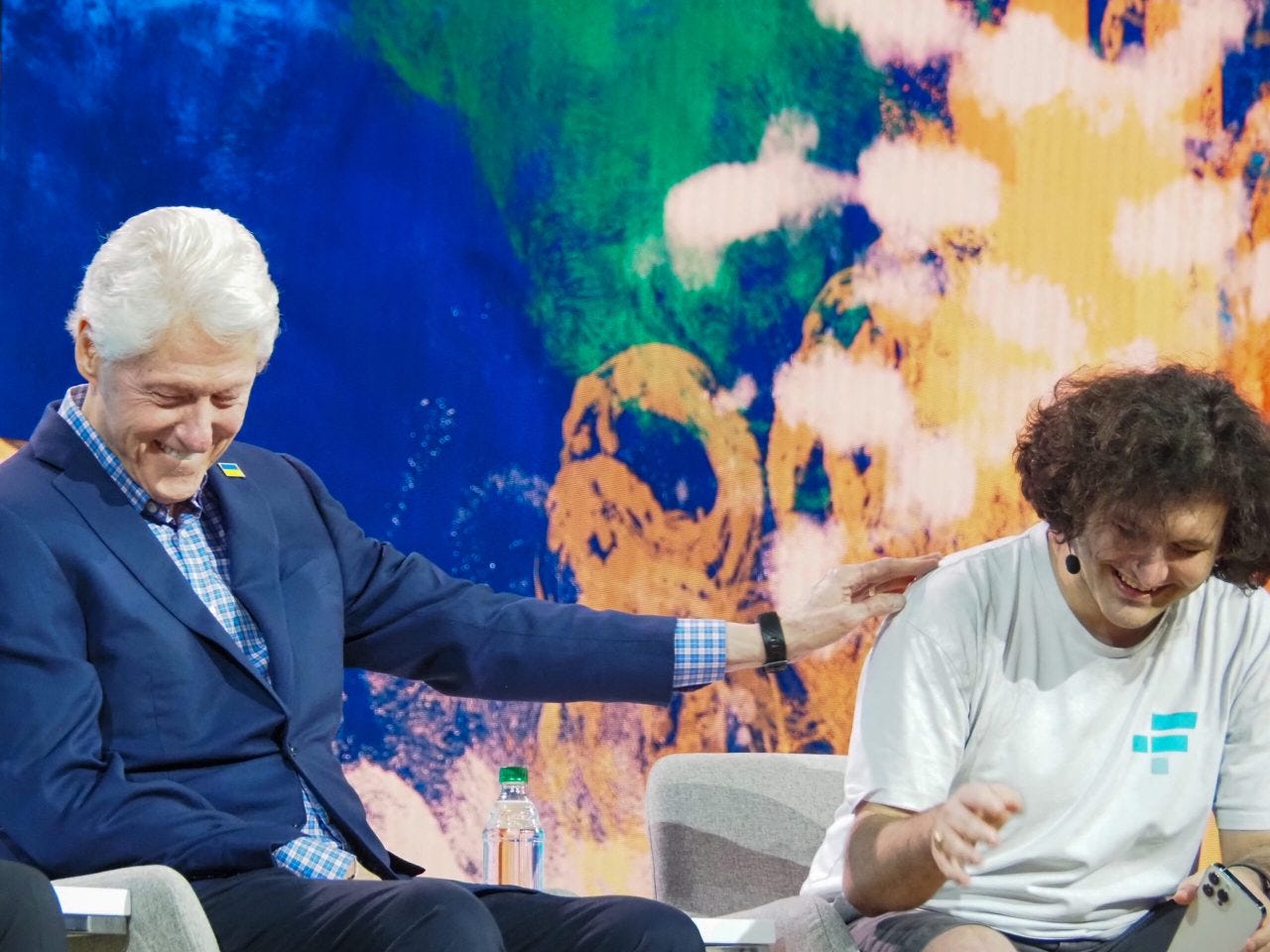
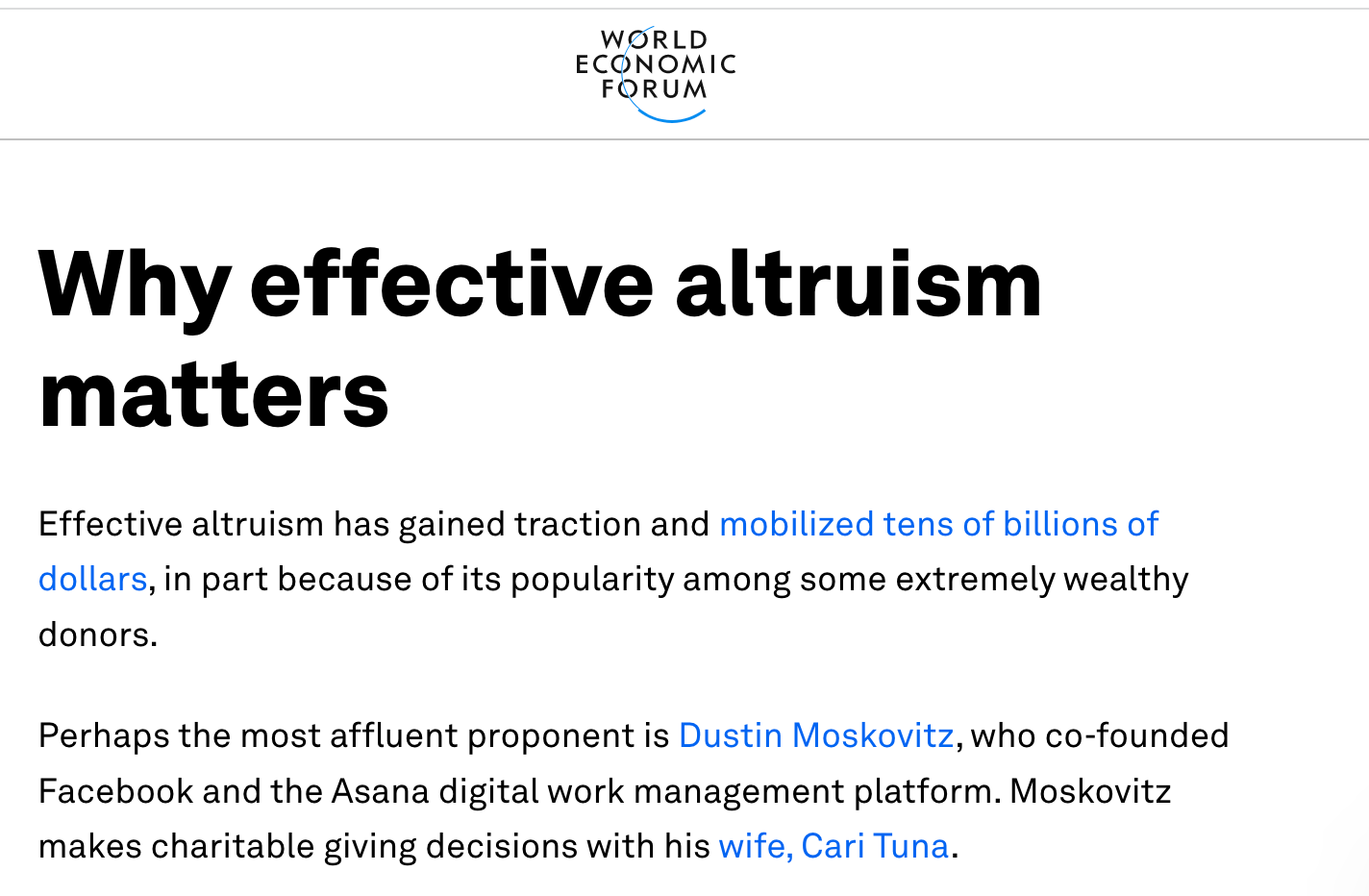


Effective Altruism is basically baked into Stakeholder Capitalism.
Well done. Not only well researched, but explains utilitarianism and effective altruism in a crisp and clear pedagogy. Utilitarianism, in my view, is exactly what would happen if a programmer could possibly program a “working philosophy” into an AI. Everything accounted for with no nuance or human element. Bentham’s panopticon manifested. I wonder what an effective altruist’s answer to Catherine Austin Fitt’s moral dilemma of pushing a button to eliminate all drug money laundering in the world, which would collapse the economy but free many people from their addictions? Maddie I’d love to see you debate MacAskill.